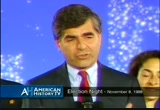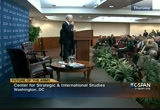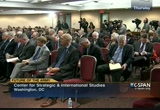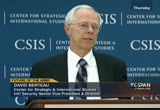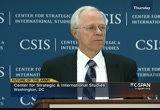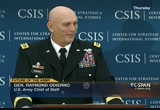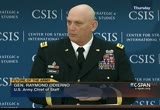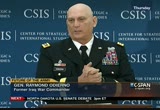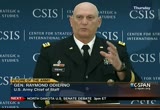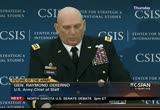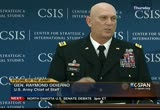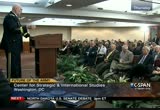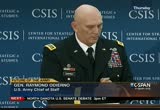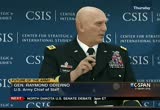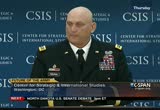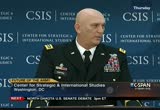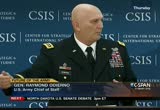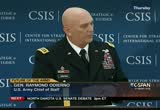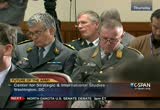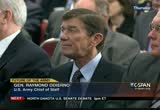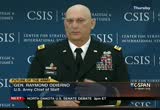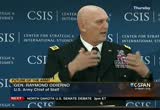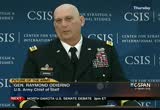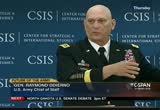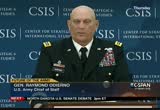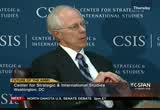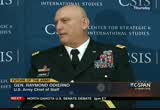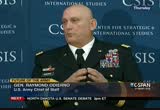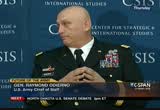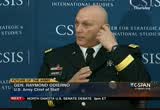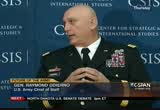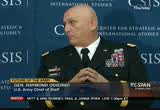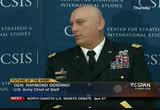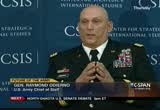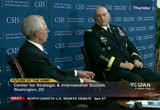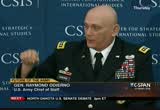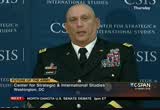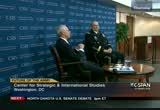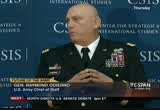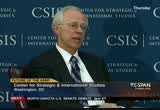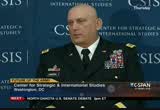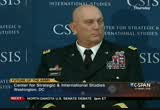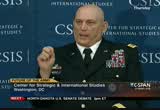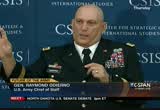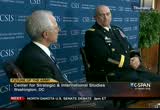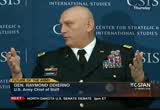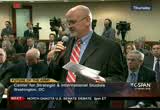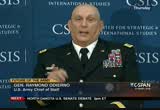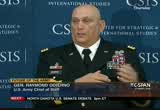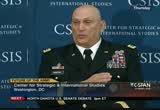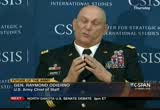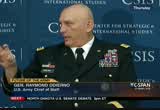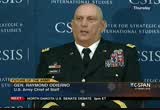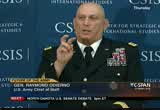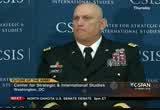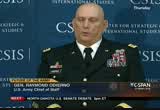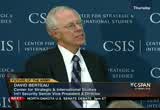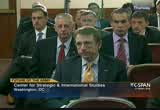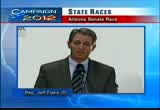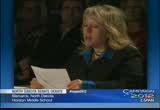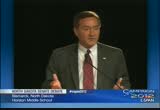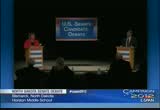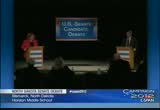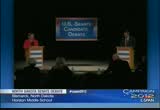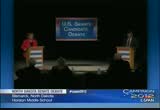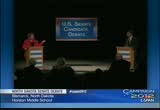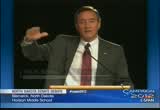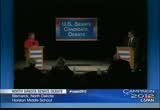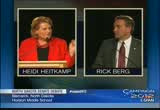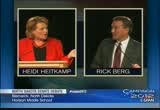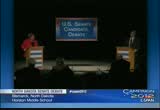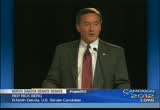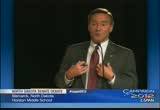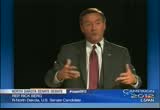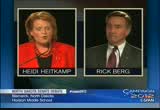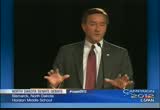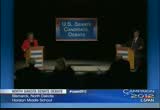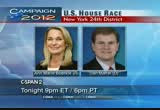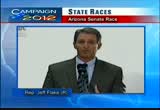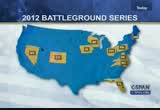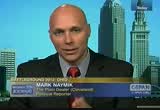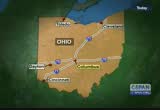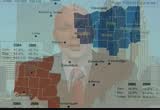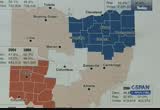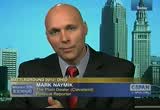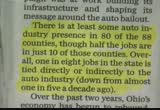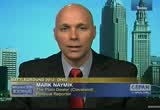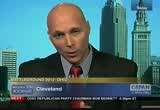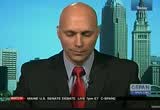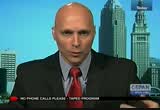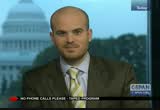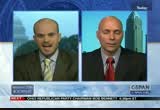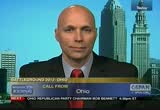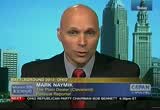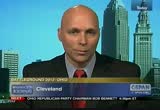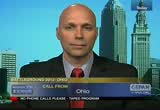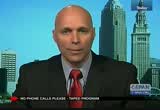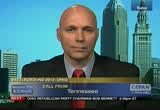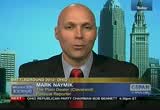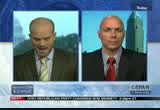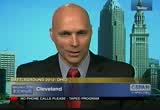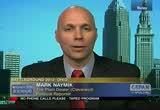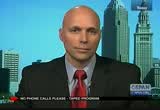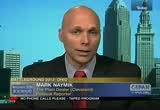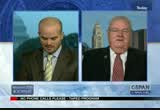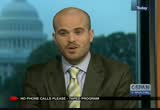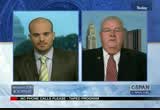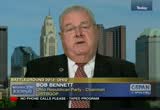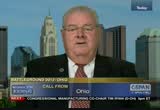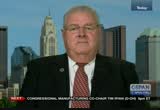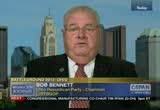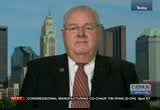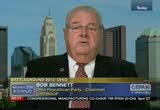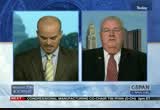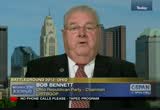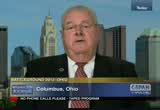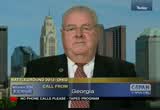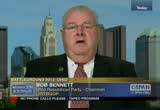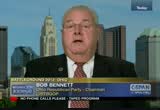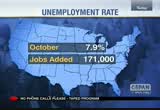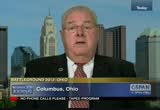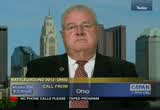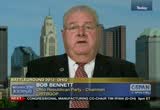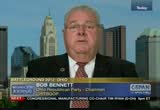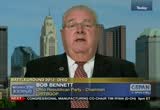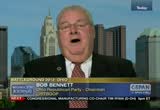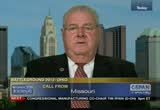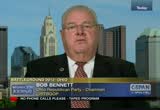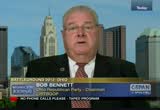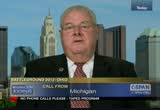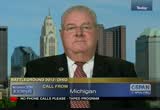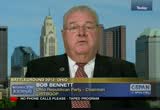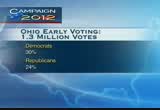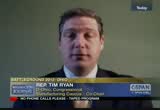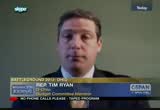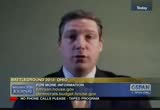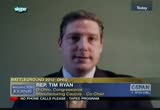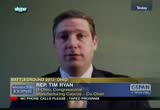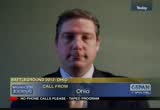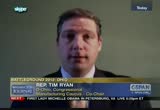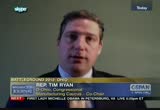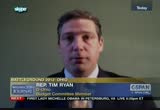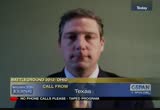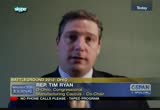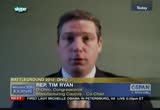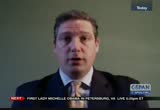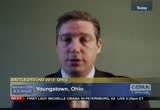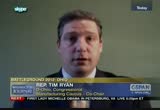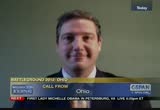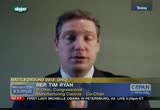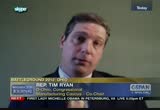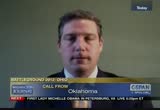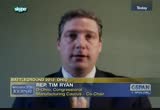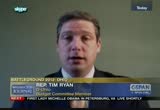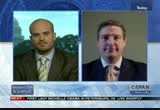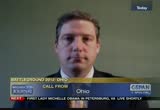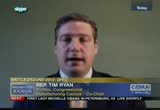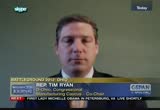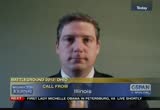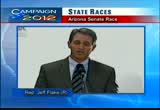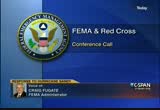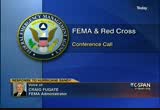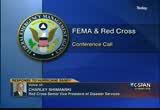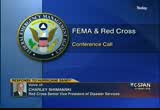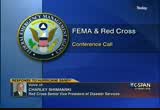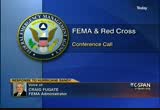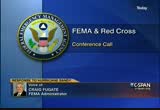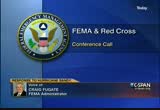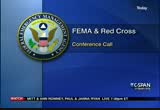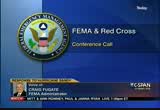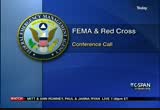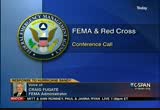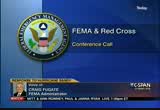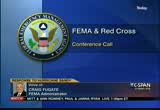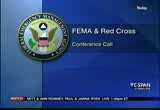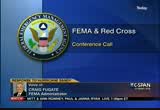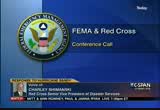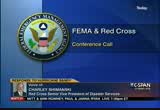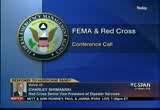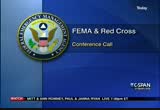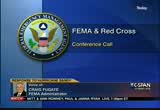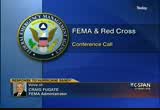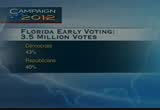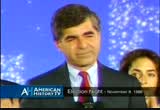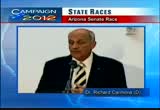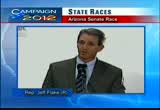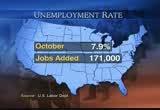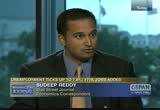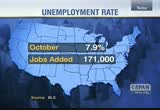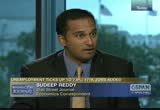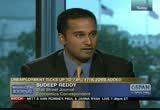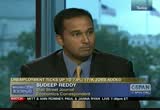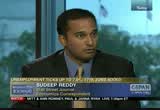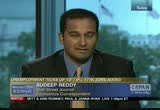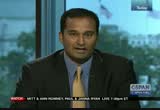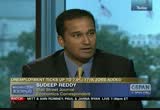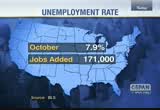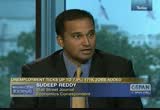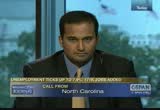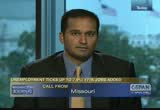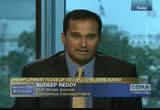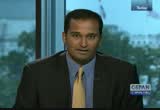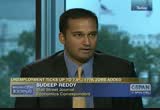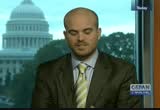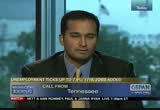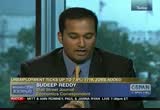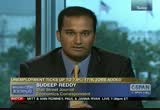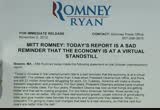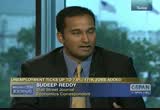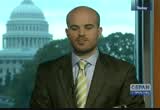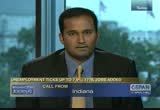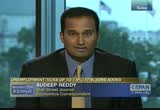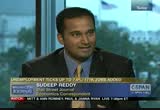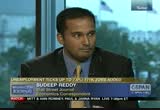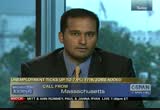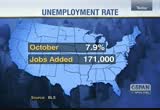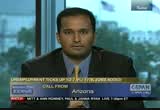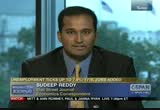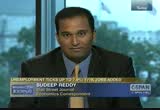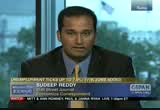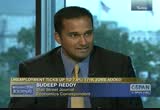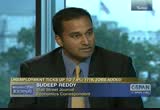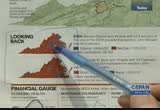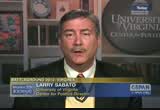tv Politics Public Policy Today CSPAN November 2, 2012 2:00pm-8:00pm EDT
2:00 pm
2:01 pm
future of the army saying there is uncertainty across the globe. this is an hour. >> good morning, welcome to everyone in the room. welcome to our viewers on the web this morning. i'm david berteau, director of the international security program here and the host for this morning's military strategy forum. we have been doing these forum for about a dozen years now almost, and it's due in great part to the generous support of rolls royce north america, we thank you for that support. without which we couldn't do
2:02 pm
this program. it's a pleasure for us to have with us this morning, the chief of staff of the united states army, general ray odierno. general odierno is from new jersey. anybody who is from new jersey these days has been a little bit distracted. new jersey took the brunt of the storm. i grew up in louisiana. we are sort of used to this sort of thing, but we don't usually have hurricanes that have a wind chill and snowfall associated with them. which complicates matters. i hope everyone's all right up there this morning. we have been doing this series recently focusing on where are the military services going? it's a very important point of history. general odierno started in the army back during not the last draw down but the one before that. the one after vietnam. those of you who have been coming to our events know we have been talking about draw downs for some time now. eventually it had to get here
2:03 pm
and we are now at the cusp of one. we don't know how long, far, or deep. but there are a lot of lessons from the past that need to be applied to this going forward. there are also a lot of ways in which it's different than before historically and we'll explore some of those this morning. the way we are going to lay this out, make sure you turn off your cell phones so we have no noise makers in the room other than the authorized ones. we are going to have a short discussion, general odierno will give an address from the podium here. we'll have a chat here on the stage. and open up the floor to questions. in order to maximize the number of questions that we can get asked, we are going to ask you to use the note cards. i think they have handed out. if you don't have one, can you raise your hand, you'll get one. you write your questions down, try to make them readable, hold them up when you are done and people will collect them. we have in front here a couple experts who will simulate the questions and they'll ask you the tough ones once they come around at the end here. so that's where we are going to work that.
2:04 pm
i want to welcome you-all again and ask you to please join me in a warm round of welcome for general ray odierno. [applause] >> thank you very much. i guess i remembered to turn mine on. it's great to be here, have this opportunity. when we talked, we thought we get 30, 40, 50 people. looks like we got a few more than that. i appreciate everyone coming out today. i want to talk about several things. i'll take about 10 minutes and just give you some of my thoughts. i really want to leave a lot of time for discussion. i think that will be the most beneficial thing for you and for me. i don't mind tough questions. those are usually the best that you get a chance to answer. again, thanks. i want to thank csis who for 50 years has provided these valuable strategic insights and i appreciate the work by. he kept telling me i was stuck in rome.
2:05 pm
rome n fall, it's nice. but he really was trying to get back. i appreciate the effort, sir, as always. david, again, thank you so much for taking this on. one of the things that i initially talk about is as we look to the future we got to also figure out where we are today and how we get to the future. because it's just not about going right from today and you get to the future. you have to work your way through a series of timelines and other commitments that you have. so let me start out by reminding everybody that as i stand here today, the army has 60,000 soldiers in afghanistan. we have 15,000 soldiers deployed in kuwait, kosovo, philippines, sinai, horn of africa. we have about 90,000 soldiers and civilians forward stationed across the globe in nearly 160 countries. so that's where we start from.
2:06 pm
as we now look to the future and look at a new defense strategy as we try to work through what the roles of the different services are and the defense strategy, i also remind everyone that we are also going to be downsizing during this time. the army, who at the beginning of calendar year 2012 was 570,000, will go down to 490,000 in the active component by the end of 2017. we have significant deployed commitments. we are downsizing our army, and we are now looking to the future. one of the main thing is we have to do is ensure we have the right mix. i always talk about my three rio stats that the secretary of army and i pay a lot of attention to. end strength, modernization, and readiness. because in general terms those are the drivers of our budget. we have to keep those in balance. we want to learn from the lessons of past draw downs.
2:07 pm
some of the lessons is you can't get out of balance. because if you get out of balance you start to have an unready army. which leads to a hobbled army. we talk about task force smith and its impact and unpreparedness as was asked to go into korea post-world war ii. we don't want that to happen again. the second of the army and i have been very clear that we are committed to make sure that we are ready. so no matter what size we end up the one dominant factor is we'll be ready, modernized, be prepared to do whatever mission we have. we've got to make sure we keep that balance. we got to keep reviewing it and adjusting it. we got to make sure that we have a ready capable force to meet the future missions. that's what we are focused on as we go forward as well. we got to make sure we have the right mix of forcers. when i talk about mix, it's about light, heavy, medium. it's about active component, reserve component. it's about the right mix of civilians, military, and contractors. it's about the right mix between the operational army
2:08 pm
and institutional army. you have to get all of that right as you move forward. and you got to figure out what is that right mix? what are the qualities you think you need to have as you go forward? so we have to learn from the past. but we also have to capture recent lessons. then we have to see how do they apply to what we think the future operating environment will be? so it's about learning from the past, it's about applying the right lessons, but it's about how does it apply to the future operating environment as we go forward? so we have to update several things. we just rolled out brand new doctrine. the first time the army has done an extensive doctrine in recent memory. and we have published the initial high level documents of our doctrine, we'll start to publish the subelements of this over the next six, eight months. it represents some of the lesson we learn and how we
2:09 pm
think it will apply to the future. this is key as we start to look to the future making sure we are based in what we believe is the way forward and we do that by writing doctrine. we have to look at operations, type of operations. what are the best way to train our forces for the future? one of the more important thing is how do we develop leaders? we believe one of the most important things we have to do is adapt our leader development programs. what i mean by this, about adapting leader development programs from the time you start as an rotc cadet or da debt at west point, all the way through the time are you a general officer. how do we adapt those in order to be able to understand and operate in the complex environments that we think we are going to have to do in the future? we have to implement new d.o.d. strategic guidance which the army in my mind play as critical role. the army will and continue to be an indispensable part of the joint force. and although we sometimes talk about army, navy, air force, marine corps, it is about the joint force. it is about the sin ergey
2:10 pm
gained from all the services in order for us, in order to meet our nation's needs, and that synergy and balance necessary to move forward and implement the new strategy. one of the issues i always have as the army chief, when people want to do an evaluation of the army, now look at brigade combat teams. how brigade combat teams you have, how many you need for the future? that's important. that's fundamental to what we do. however people tend to forget many other parts about the army that are so critical to us supporting the joint force. first, 75% of the operational force and special operations forces is army. can't forget about that. we have to make sure we stay responsive to civil authorities. for example he we have continued to make sure we have the right capability to respond to wildfires, hurricane relief, as you see what's going on today up in the northeast. we have provide add broad range of essential services today to combatant commanders, that includes intelligence, surveillance, reconnaissance
2:11 pm
for all the geographical combatant commanders. we provide air and missile defense for all the commanders. we provide logistical support for all the geographical combatant commanders. we provide signal communication support to all the geographical combatant commanders. these are key critical missions that people tend not to think about. as we go forward. so it's important that you understand that. we provide key for aviation, fires, information operation, civil affairs, military police, wmd defense capabilities. corps of engineers who are pretty busy today and doing many other things. we have critical components of the military space program. for example, we are responsible for everything from the satellite on down to the ground station in providing communications based on space elements. a lot of people don't know that.
2:12 pm
that's the army's responsibility. as we look ahead, obviously cyber is one of the more important things we have to remember as we go forward. as i look at cyber there's a couple things, you have national level and operationalical and how we develop this for the future and what does it mean for foot ture way of conflict. how do we integrate that into our operational tackical forces? how do we protect our own networks? all of this will be critical as we go forward. now we have to put that against what i consider to be what is the operational and strategic environment we are going to have to operate? there's much discussion about this and there should be a lot of discussion about this. the one thing do i know is there's incredible uncertainty as we look to the future. every monday i have my intel people come in and brief me on hot spots. and we put a map up and all i know is, i can go through -- i could spend a whole afternoon
2:13 pm
talking about the hot spots. it covers the entire map of the world as we talk about hot spots and potential areas of instability as i would call it. one of the drivers of instability that we face and how are we going to meet and try to reduce those drivers of instability that impacts our national security? whether it be in the middle east, which you read about every day, whether it be syria, iran, whether it be pakistan. continuing work in afghanistan. the sunni-shiia fault lines in the middle east. whether it be the pacific with the rise of china. we look at what's going on with the islands within the pacific. korea, 29-year-old leader in charge of korea. what is he going to do in the future?
2:14 pm
you have narcoterrorism, transnarcoterrorism, what does that mean to the future and security of our country? i don't know. but these are questions we have to take a look at. and these are questions that we have to be prepared to operate in. the other thing that i have learned frankly, the hard way, over the last several years my time in iraq is you have also have opportunists who will try to take advantage of instability and destabilizing influence and nascent governments or failing governments. and these opportunists are maybe unpredictable. and i always use iraq as an example. there's lots of opportunists in iraq. iran, turkey, saudi arabia, kuwait, nonstate actors. all opportunists trying to take advantage of a situation. how does that project itself around the world?
2:15 pm
what does that mean to us as we look at the future of conflict? the cast of conflict is changing, the operational environment and conflict is changing, but in my mind the fundamental nigh ture of war remains the same. that's the struggle to influence populations and governments. that has not changed. so it's how we continue to understand that struggle within the new operational environment and context that we see it. the army was created 237 years ago to defend this great nation and in my opinion that imperative has not changed. so as i adapt the force for foot ture, the one thing i tell everyone is that we are starting from a position of strength. why do i say that? because the army specifically we have the most combat tested, combat ready, combat experienced force we have ever had. what makes this different than the one that came out of vietnam, for example, is this is an all volunteer army. in vietnam it was not. a lot of that experience went back home. today we are going to sustain that experience. we are going to sustain those
2:16 pm
leaders. so in my mind we start from a position of strength as we want to move to the future because of the experience, capability, that we now have. it's important that we leverage that as we move forward. as i look ahead, there's a couple things i want. i want an army that is capable of many missions, at many speeds, many sizes, under many different conditions. and the capability to operate in any environment. so i kind of put that as a start point as you look at what role we'll play in implementing the new d.o.d. strategic guidance. and, yes, the army will always be there to fight and win wars, it's no longer enough. whether it's fiscal constraints or whether it's the way the world is changing around us, as an army we have to do much more. it's essential for us to help the geographic combatant commanders in order for them to shape a complex and dynamic
2:17 pm
uncertain world. conflict sultmatically a human endeavor and the army strength is operating amongst populations. at the nexus of many domains, including cyber, it's very important for us to understand the relationships between cyberand the human dimension and the land domain. what does that mean for future conflict? i think sometimes in our conversations we don't really talk about that. and it's important for us to understand that as we move forward. i believe the army's unique strategy capabilities are crucial as we move forward. we have to be able to providal flexible mix of capability of armored, medium light forces. we have to provide strategic depth and versatility. global response forces capability of deploying anywhere in the world in 24 hours or less. we just recently complete add joint readiness training center, and this week at the national training center we have established what we believe we might look at in the
2:18 pm
future. what is the future environments that our brigades, our divisions, our companies might face? it's a joint intergovernmental multinational environment. it has interagency participation. it's environment that might require some combined arms maneuver, but also has a touch of terrorism, criminality, opportunists. it's a complex battlefield that one minute might require some level of combat operations, the next minute might require leaders to adapt and understand the social economic conditions they are operating in and how do they integrate the interagency multinational actors in a very small area. and that's important for us. so we are now training towards that.
2:19 pm
we are adjusting that as we go forward. it will be important in informing us the type of army we need, what are the capabilities we need, modernization programs we need as we go forward. we also in my mind provide something that the other services can but we have had a lot of recent experience in, and that is providing j.t.f. capability headquarters. and we have completely now over the last 10 or 12 years deployed j.t.f. corps, what we want to do is build capabilities that allow us to have joint task forces capable of operating from the lowest level all the way up to support the combatant commanders in achieving their goals whether it be in shaping their environment, preventing conflict, or actually executing conflict in some way. it's important for us in that area. so there's some things that we are already doing. from up until this year, the army has been built and organized over the last five or six or seven years in order to respond to iraq and
2:20 pm
afghanistan. the army force generation process a. process that was essential at the time to ensure our forces were ready, prepared to operate in iraq and afghanistan. we need to look at how we are going to translate that to the future. and the first step is going to regional forces. we are going to adjust this army force generation model in order to train and then make available to combat yand commanders, regionally lined forces. that's all sizes. it can be platoon, brigade, it can be combat. combat service support. developing capability so we get better at building partner capacity. multinational exercises. we have a brigade, the 16 nd brigade, which very few people know about, they were established several years ago to help us build and train our teams that are training both iraq and afghan forces.
2:21 pm
we are going to adjust that command once we get -- as we start to come out of afghanistan to look worldwide how we do building partner capacity. they will be our training center for making sure we are training our individuals properly in order to be able to do this. those are some of the subtle adjustments we are making that will continue to move forward. this year we are aligning the second brigade and apricon has given them 96 mission overs the next 12 nonts execute. from platoon level all the way up to higher level of exercise. that's the needs that are out there now. that's how we'll continue to adjust as we go forward. i already talked about responsive scaleable packages. we are also looking at soft conventional force interdependence. we work very closely with special operations command and continuing to vest relationships that we have had over the last 10 years in iraq
2:22 pm
and afghanistan. how does that project to the future? we are standing up in office of strategic land power. that will be the special operations command in the army and marine corps, to look at future conflict. what does it mean to ground forces? what are the characteristics and capabilities that we want? so just an example, for example, first corps, out of fort lewis, washington, just returned from afghanistan, they are now aligned with paycon. and in fact they are going to undergo a paycon sponsored exercise this year. they are engaged in lanning efforts for war plan security cooperation, bilateral, and multilateral exercises. they'll provide options for security force assistance, humanitarian assistance, disaster relief in the command area responsibility. these are just some of the things rear doing. i wanted to just quickly fill those out so you have an understanding where we are
2:23 pm
beginning to head. so in the end i think we are going from an army that was organized and trained over the last 10 years for iraq and afghanistan, one that's going to go to regional aligned forces and one in the future i believe will go to mission tailored forces. that will be tailored to specific missions and specific areas of the world, but also have the ability to sustain a campaign quality if it's needed, depending where it might be. again i want to reiterate our goal is that we'll have an army that provides capabilities for many missions and many speeds at many sizes under many conditions to operate in any one of the complex environments that we'll be able to go. i want to thank you again for allowing me to speak. i look forward to your questions. i'm just say one thing in closing. what i do know is that the nature of conflict as we go forward will continue to require presence in order to achieve decisive results. i reiterate that war fair will continue to be a human endeavor.
2:24 pm
you have to understand the human dimension of conflict. how it integrates with land, air, and sea, and cyber. this will be essential to us as we i am plement the future security strategies of this nation. so with that i'm end and i look forward to your questions. thank you very much. pleaspleas [applause] >> it's wonderful to have professional logistic support when you need it. general, that was a very good and thorough tour of the challenges that you are facing there. you look back over the last decade and the army really has had some remarkable achievements, both at the individual level and every unit level all the way from squad on up. it's really been quite a remarkable run. in many areas in which we never
2:25 pm
knew we were going to have to use our army to do both missions, functions, and operations. some of that is not easily translateable into the world we face today. and you hinted how you would look at it from an organizal point of view. the strategic guidance, you got there just in the nick of time to participate in the development of the strategic items, all the meetings that took place, but it's still an evolving dynamic. the ends haven't been specified all that well. takely the ways and means haven't been finalized yet. we got some tough challenges there. how do you wrestle with the question of translating the successes of that army into what will almost certainly be much fewer resources going forward? you talk about some of your downsizing, but the end's not necessarily in sight yet, is it? >> we don't know. we'll see what that turns out to be. again that goes back to one of my comments as i look at the army, again it's about that balance. i talked about of end strength
2:26 pm
and readiness and modernization. we can't ever get out of balance. if we get out of balance it will cause us potentially to be unready. it will cause us to lose our overmatch capabilities we might have with our potential adversary. it's important that we keep that in balance. the thing that i like to stress is, it's about developing your leaders. ultimately that's -- when i talk about leaders, i talk about noncommissioned officers. so for us, because of the complexity and how it's changing. we could sit here and everybody could have an opinion of what the environment's going to be like and how we might use our military, but nobody knows. nobody knows. we are trying to predict it, we are trying to make sure we are understanding the world and make sure we are ready for that. it's going to take adaptable leaders who can understand the environment and how they use the resources and capabilities that we have given them to be successful.
2:27 pm
one of the things we have to focus on is that. so as i look ahead, one of the things i have to do is reinvest in our institutional army. because over the last 10 years, rightfully so, we took risk in the institutional army to ensure we had enough people in order to execute the two wars in iraq and afghanistan. we now have to go back and reinvest in our institutional army which will help us to establish ourselves, think through, and understand these difficult problems and how we want to adapt leader development, how we want to adapt organizations, and how we want to adapt capabilities. and to me that's important. and what we don't want to do is rush into this. and that's -- we have to take our time. we have to continue to iterate. this is not a one-time answer. when the budget comes out here in 1317 budget, that's one shot then we got the 14-1, 15-19, 16-20 that all affect as the chief of staff of the army. it's building that army over time, understanding the resource that is are available
2:28 pm
to do that. >> it's true that as you described that process. it's one of the strengths of the defense department, if you will, is the ability to have not only an it aive process but one that's fiscally disciplined and programs out for a number of years in the future so you have a road map and mapped your resources against it. we are a little bit out of practice at doing that partly because we have been busy doing other things. partly because supplementals. how do you re-establish that capability inside the army? >> i remind -- i try to remind all our leaders that the last 10 years have been a resource rich environment. and i mean that because whenever you're involved in war, our nation has been steadfast in making sure we have what we need to do that. there might be differences of why we are there, how we are there, our congress has always been good to make sure we have
2:29 pm
the right money to do what we need to do. that's no longer going to be the case. first it's about putting the systems in place to understand and make sure that we are using every resource to its best capability. certainly, take an example, let me take training, for example, have we done training over the last years ronet replicate how we do training in the future. we were training for specific missions, for responsiveness to our mission in iraq, our mission in afghanistan. we now need to go back and start training using virtual constructive and live capabilities in order to develop our army to do initially combined arms maneuver and additional capabilities that allows them to be regionally capable. we don't know how much that's going to cost. we haven't done it so long. we developed some systems along the line to allow to us do it more efficiently.
2:30 pm
we are conducting pilots right now, fort hood texas, that will take a look at what this means. comparing readiness. of it's not training more efficient. it's just as effective. we are working our way through that. we are looking how we adjust our training centers and how we can make them more efficient and get more capable in developing our forces. those are the kinds of things that go in the institution. i talked about the doctrine already. that's underpinning this and the leader development program. this is a very complex move. so people ask me, you know, you are facing challenges. i see it as opportunities. we have an opportunity here to really impact the future over the next four, five years. we have to. we have no choice. so we have to take advantage of that and see it as an opportunity and really try to get our army, armed services moving in the right direction
2:31 pm
to prepare us and make sure we continue to be ready to meet our security needs. and to me that can be pretty exciting, actually. >> the challenge that you face is one that in some ways has been a long time anyone has faced. you mentioned the need for the plecksibility and adaptibility. for not necessarily knowing exactly what we are going to do. for our lifetimes we sized our force structure based upon the requirements out there. it's the operational plans during the cold war and two m.t.w.'s and various iterations and the wars themselves. how do you anchor that flexibility and adaptibility to anything that lets you size force structure? >> it is difficult. >> 10 years ago i was in charge of the army force structure. i was involved in this. i have been involved off and on for a long time. any one of us -- i grew up with a scenario that could make us
2:32 pm
build a million man army or 100,000 man army. say, with the air force and navy. so in my mind scenarios areal guideline in order for us to say can we meet certain scenarios. it's about having the right capabilities to what i call win. prevent. first you want to have the right mix of capabilities that allows you to prevent miscalculations by our adversaries. the right balance of ground, air, sea satisfy in order to deter. there's a size to it. there's a quality to it. and we have to make sure we have the right size and quality in order to deter conflict. what we have learned over the years is that countries watch us closely. they watch where we have our weaknesses and do everything we can to, ploit those weaknesses. we have to have an army, joint force, that can shape the environment for our combatant commanders.
2:33 pm
i think that's one. things that this new strategy is driving us towards, which is a good thing. the path we have not had the opportunity to shape our environment, at least in the last 10 years, because we have been so involved in iraq and afghanistan. there's been forces after shaping, but maybe not to the level we need to. so it's important that we understand that's our mission. i think what what's encouraging to me is i have watched and seen how adaptive our forces have been over the last 10 years. so i know we can be adaptive. i know we can do more than one thing at a time. we have to organize ourselves. have the right training capabilities in place in order for us to take advantage and maximize the use of every organization that we have. to do several different missions. doesn't mean that every unit has to do every mission. it just means we have to prioritize and make sure we organize ourselves in such a way to keep us meet a broader
2:34 pm
variety. >> if you do it that way you sort of -- on the one hand it doesn't drive a particular size of force structure, but it drives the interrelationship, elements of that force structure. on the other hand, it also doesn't give you the basis for what you're equipment needs to be. how do you translate that into equipment requirements? >> it's a base line. so the base line is, i believe that for combat forcers you have to have the capability to combine armed capability. that's the baseline we have to train to. that defines what our equipment is. what are the needs we need to move into the future. once we get to that baseline is where you build in in my mind a variety of capabilities that meet regional needs. so you get to a combined baseline and then you are able to allocate or align forces in such a way that gives them the opportunity to learn different core capabilities to support
2:35 pm
the specific command. centcom, whatever area it might be. >> you mentioned the need for building partnership capacity and some of our successful practice that is we developed over the last decade. and institutionalizing those worldwide in effect. there's no place where that will make more sense than the pacific where we have now enormous opportunities for increasing engagement. those again are not big budget drivers. they are not big equipment drivers. force structure drivers. part of partnership capacity is not just how well others can work with us. but how we can work with them. how do you tackle that? especially in an area like pacific? >> i think what we want -- first it's about developing relationships and trust. so initially we have to reinvigorate the army relationships in the pacific. we are doing that now. but because we have not been able to do what we wanted to in the past, we have to refocus in
2:36 pm
those areas. i remind everybody the pacific, now it has lots of water out there in the pacific. but they are still land centered government. we have to engage and be able to develop these relationships. but we have to be able to ensure that we can do multi-viral events together. you build confidence, and then you build the capabilities that you think are essential for them to have to fit in the overall regional security strategy. >> when we took a look at that at csis, we took a four-star position for the army in the pacific, not because that is the requirement of the job, but because it is what is needed for the situation if you have questions, hold your cards up
2:37 pm
now and a staff will collect them. in times of tight budgets, there is a tendency to circle the wagons and not necessarily want to collaborate. are those the kinds of records that are going to make you sick, this is a zero sum game and you're going to lose? >> we need the best joint force necessary to go forward and you have to look at them from a joint force perspective. as we reduce capabilities in one area, those capabilities have to be picked up by someone
2:38 pm
else. we ought to make sure we are doing out properly. i would say, the first $487 billion worth of cuts, the army took a good portion of that. and i agreed with that. we have grown and i think it was appropriate for us to look at reducing our strength. i will always continue looking at it in that way. but i also have to remind people that i also strongly believe that those who want to assume away a need for ground force capability, i don't agree with that. i think it is a very dangerous road for us to go down. i have to balance that, and i will as i give my opinions. >> just for the record, given its fiscal year 2013, the reductions in the budget control act, the army to 15% of that cut. the navy to a 7%.
2:39 pm
if you extend that out through 2017, it got back more in balance. but that was one of the pure results of that effort. going forward, i will not speculate about increases or decreases, although i suspect questions will come back to that. are we ready to go? let's get some questions from the audience. >> happy to have you here, sir. the first question, i will lump a couple together because it is a common theme that has been coming in, and it has been to do with maintaining the right people based on the reductions and the drawdowns and the change in deployment. what specifically are you looking at with respect to the right quality in the force, and also a leader development in that? you have addressed leader development a little bit.
2:40 pm
how we maintain the right forces as well? >> in his last budget cycle, one thing i have pointed out is that that we would do the reductions in a five-year time frame. the reason i insist on that is, so we could do it in the right way. there are three reasons. one is, we are still in afghanistan, so we have to be careful about doing it up front. secondly, we have to take care of our families and our soldiers. third, by doing it this way, we are able to do it in large majority by natural attrition. we will not have voluntary separation. we will choose who leaves the army. we have several vehicles to do that. we have done very well in the first year of this. i'm very pleased with the results we've had in terms of sustaining the best. retention, for the first time -- not every soldier who wanted to stay in it was able to, but
2:41 pm
we did it based on the commanders' input. that is how we will go forward. we will decide who stays and who leaves based on past performance and future potential. >> that is an astonishing change for the army in the last 35 years. it holds a lot of promise. >> one of the reasons i insisted on this -- i had a discussion with general sullivan, who was the chief during the large downsizing during the 1990's. he said what bothered him is that they downsized so much that they could not control it. he said, you have to try to control that. as i look back at what we did back then, we have worked with congress to do that. to me, that was one of the key pieces. it is not just the size you get down to, but how you reduce. that is what has been so key for us.
2:42 pm
>> you talked about balance in the downsizing process. as the air force learned last year, this can be a contentious process. how will you maintain the balance going forward? and what is the right balance between active and reserve? >> we have handled a very easy way this time because all of the structure of the active components has been very cordial, as we move forward so far. keep doing it that way, and a problem. but if we get additional cuts, in my mind, it will be a combination of guard and reserve and u.s. army reserve -- i mean, guard and reserve and u.s. army and active. there are characteristics that are important. people have been confused with what has been going on in the last five years and what we want in the future.
2:43 pm
in my mind, what happened in iraq and afghanistan is exactly how we designed it to happen. the active component responding initially was able to get things a establish, and then as we needed more depth, we were able to move into the national guard and reserve. that worked very well we are way more organized now in the army. there are some national guard and reserve units that have to be ready to deploy very quickly. those tend to be combat service support outfit that require much less trading capability. the guard and reserves issue is time, not money, but time. they only have so much time to sustain regiments. the characteristic of an active deployment is ready, and to maintain a level of readiness that they can respond to over a
2:44 pm
longer time frame. as i go through this, i have to balance that and decide what i need as they go forward. that is part of the decision that we will have. we have additional cuts that require us to go after both be active and reserve component. the army is not about active verses reserve. it is about have been the total army package that allows us to meet our security needs. we need the right amount of national guard forces, and reserve forces and there are state requirements. and we also need to decide what we need in the u.s. army and reserve. we will continue to be completely transparent as we go through this process. >> as a follow-up on that question, you mentioned the capability that has been
2:45 pm
developed in the last decade and the need to sustain that at the individual level and the unit level. you have that capability in the national guard. time is your challenge. is there some way to modify that? >> what i tell everyone is that it is not going to be like it has been. i do not think the guard can sustain it. this gets back to employers. employers are ok because we are fighting wars in iraq and afghanistan. when the wars are over, it will be more difficult to get the employers to agree on a longtime friend. you have to understand that going in. you put the army force generation model, rotate them through that, and it allows them at certain times to increase and get a higher level
2:46 pm
of training. and we're working with them there. but even that can be difficult. you ought to put it into perspective. is about how much time they have in order to prepare. and how much employers are willing to put up with. and how much the people who signed up are willing to put up with. you need a balance. we need a strong national guard. there are critical in many components to us as we go forward. we have to balance that. >> another cluster of questions is coming in on both concept of access and power projection of army forces. the first question is how the army perceived as anti access area that i will challenge broadly, but its role in defeating and overcoming it. and secondly, given the fact that the large proportion of the army is now conis-based, what is the projection for
2:47 pm
getting forces forward? >> we have 66,000 soldiers stationed in the pacific. due out this of a capability that is forward. but the point you're making is a good one. there are two issues to access. one is, i think is important for us to reengage and build relationships in the pacific region. we need to gain access to specific areas. over time, you do trust, multilateral training,
2:48 pm
exchanges that might allow us access to certain areas if you need them. i think the army can do some of that. in terms of anti-access, these operations are those that we will continue working very hard on. as we are developing ourselves coming out of the last two wars, we are focusing on a forced entry operations. and we're working on that in a variety of environment. we're working to more significant levels of forced entry operations. and we're working on this with the marine corps as well. in my mind, there is a ground for this. if the access area denial is important, then requires a joint force, depending on what you are trying to achieve. you cannot achieve, in my opinion, -- it depends on what you are trying to achieve.
2:49 pm
i think everybody agrees with that. in fact, the joint staff are working toward the operational concepts for this as we move forward. >> we cannot wait to see them. it is quite a tough challenge. >> several questions are your comment on the institutional force and your refocusing on that. can you define how big it has been and how big it should be? >> there are a couple of aspects to this. we're going through this reduction out. we took all of the reduction out of the operational force. i did not reduce the institutional force. why? because they have been reduced and gutted over the last several years combined. in my mind, in looking at
2:50 pm
moving forward, we have to reinvest our military members into the institutional army. we have had lots of contractors, more civilians. we want to keep some of the capacity and a unique capability. but i have to invest more uniformed personnel back in, senior noncommissioned officers and officers back into our training pipeline. it is important but we do this. because for me, they will be the engine that drives us as we continue to adjust, whether it be a leader development programs, developing new concepts, we've got to have the right people. it also allows me to keep some people there that if i have to expand the army in the future, i have a basis of leadership that will allow me to expand the army more quickly. if we go back and said, we are going to take people out and go back to something more contractor-centric for something in the future.
2:51 pm
to me, both of those reasons focus on this time of investing in education and development of future capabilities, tactics, techniques, and procedures. we have to invest in that going forward. >> could i do a short follow-up? what does that approach imply for the army civilians and contractors? do they become diminished? >> they might in terms of numbers, but it will still play a role. >> and how do you incorporate the planning of what those numbers need to be, particularly on the contractor side? >> you want to have the right balance. again, contractors provide us with its unique capabilities
2:52 pm
that we simply do not have. that is what they will focus on. we have department of army civilians that will provide continuity and consistency that we need. then you need our military members in order to provide us with experience, expertise, and frankly sometimes, just the validity of what we are trying to do based on their experiences. that is where and try to capture the right mix. right now, it is overbalanced toward contractors and civilians. i'm trying to rebalance that. >> there's a lot of discussion about what we can and will do. what are some of the areas that you think the army going forward can assume more risk and capability and competency as we deal with an air of declining or plateau in resources? >> i think risk of capabilities
2:53 pm
is difficult. it is may be operational risk is where we will have to assume it. for example, the risk is going to be how much we can do it one time and how we manage the operational risk. i think, that is more what we are thinking about. there are some capability risks that we are taking. for example, are modernization programs are not limiting, but they are slowing down. we have to watch them carefully, because we cannot slow them down so much that they become effective in making sure that we have the right capabilities. we have to watch them carefully as well. the one where i'm not willing to accept any risk is our readiness. we have to make sure that does not get out of balance. that is back to training and readiness, manning the force, and that is back to the national guard and reserve and making sure we are prepared
2:54 pm
with what we need them to do. >> one of the great questions out there right now among those of us that are talking about this is, where do you see the sweet spot of the army readiness? and by that, i mean, this band of area on the conflict spectrum, the error you are looking as being the area where the army needs to be most ready? >> it goes back to the answer i gave earlier. there is a baseline of readiness that we have to sustain, and that we have to get back to, frankly. what i am trying to make clear is that there's a sign of capability that you must always have. -- a baseline of capability that you must always have. what that means is that we have to have a tactical proficiency
2:55 pm
that enables us to have a building block capability that allows us to respond to a broad range of missions. and we have to be focused on that. in addition, we will build on that, developing regional and cultural expertise that will allow them to be effective in the region they are going to. one of the problems we have had in the last 10 years was are complete lack of knowledge about iraq and afghanistan where we went in back in 2002 and in 2003. we cannot allow that to happen again. we have to be much more aggressive and understanding and viewing things from the eyes of those in the conflict. we have to do better of that. >> one final question. we will give you the opportunity for a final
2:56 pm
comment. >> you mentioned the army's interface with the population, as well as the attraction with it. how has don't ask, don't tell don? has that had any problems with recruiting? >> we are a year into this now, so i don't want to overstate it, but it could not have gone any better than it has gone in my opinion. i think it has to do, first, with how we rolled it out, how we briefed it, and frankly, we underestimated our younger population and their ability to accept this issue. in my mind, so far, it could not have gone any better. there are still some things we have to work through, but it has gone very well. in terms of our recruiting, i always caveat this because it
2:57 pm
has to do with economic and unemployment rates. the last two years have been the highest quality of recruits the armies have had that i can remember. in terms of education level, the amount of waivers that we have granted. we have already recruited 30,000 for next year, which is half of our requirement. is already done. there are people who want to serve when the economy changes, could impact this? yes. but right now, i feel it is not impacting our recruiting. it does not impact our quality operationally, and hopefully that will continue. >> you have been in the job for a little over a year now. god willing and things go right, you have three more years to go. i know that much of the decade before you took this job, it was not in the middle of the night and waking up and saying, what would i do if i was the chief?
2:58 pm
you have other things on your mind. what has surprised you the most in coming into this circumstance? >> well, i think, -- i guess i've got to be careful. one of the things i tell everybody what i was the commander in iraq and the commander of the core there, have the freedom to make some pretty significant decisions. that freedom is not quite the same here in washington. that is probably one of the biggest adjustment. i had to realize i did not have complete autonomy. i knew that, but it took me a while to understand that really. the real challenges that we have are that we have this large organization that has to go through a significant change. it goes back to some of the things i face as the commander in iraq. it is about the vision of change in how you implement the
2:59 pm
change. three or four times on how to implement change. signing a security agreement -- the search initially, and then signing the security agreement. going through operations. it is about how you implement the change and a leadership and communicating the change i you want to make. to me, that is critical going forward. the secretary and i have spent a lot of time making sure that we communicate where we want to go. it is not necessarily something that has been difficult, but it is something that we will have to take on and continue to take on as we move forward. there is a lot of angst in the army. it is because of the downsizing and it is hard to communicate that to the 1.1 million in uniform, and in the active guard and reserves, and the active 270,000 civilians and
3:00 pm
then to the family members. that is a lot of people to reach out to. to me, that is one of the biggest challenges. >> thank you very much for being here and for your service.please join me for rounf applause. >> for days until election day. here is what our coverage looks like. michelle obama is campaigning in petersburg, virginia, today at virginia state university. tonight mitt romney and paul ryan will be joined by their wives on the campaign trail, in westchester, ohio. also joining them is condoleezza rice and senator john mccain. that is at 7:30 on c-span.
3:01 pm
the amount we have to create an environment that our small businesses can thrive. when we look at the uniqueness on the border different from the reform metered -- needed, we need comprehensive immigration reform. we have a work force problem because of our immigration system is broken. we cannot get workers to go back and forth. these problems create an impediment to commerce. we have to provide a workforce that can move back and forth easily, and now we cannot do that because of the impediments that are there by not having an effective immigration policy. that becomes an economic issue. >> some of the issues have to do with what was raised here with regard to be near the border, seasonal work that comes on, and being susceptible to a national trend when it comes to the
3:02 pm
economy. we need to do things desperately yuma. yuma, one thing we have to avoid is the sequestration that is looming at the end of the year that will hurt our military readiness. for an area yuma, it would be devastating. >> watch more debates online anytime, and throughout the day on saturday, starting at 10:00 a.m. eastern. last week former north dakota at general chris attorney general heidi heitkamp and u.s. representative rick berg participated in any debate. this debate is one hour. >> good evening, and welcome to
3:03 pm
this public forum with the north dakota candid its core u.s. senate. i am with the league of women voters and i will be your moderator. turning to me is the special sections editor for the "bismarck to be itribue." this debate takes place at the hall rise in -- horizon the school. the league of women voters is a non-partisan organization and permits the informal participation of citizens and their government. this is intended to be respectful exchange of ideas, to provide information to voters about the candidates and their positions on issues that affect the people of north dakota. please reserve applause or any action or comments until forum
3:04 pm
has ended. the forum will be as follows -- each candidate will have 90 seconds to respond to each question. following responses, we invite them to engage in a dialogue raised for no more than three minutes. candidates are asked to comply with time restrictions so we can get to as many questions as possible. let's get to our candidates. each of you will have 90 seconds to make your opening statements. >> i want to thank everyone who is in attendance. i was the television audience could see this great outpouring of interest and support in this debate, and i want to thank the league of women voters for sponsoring this debate. i also want to thank congressman
3:05 pm
berg. i got into this race because like so many north dakota andns believe washington is broken. it seems like the politicians in that town believe that what was most important was their political party, what they believed was most important was there and private interest and the special interests, and somehow the interest of the people was left behind. we needed change. two years ago yearsberg said he could go to washington and end the gridlock and take away the partisanship and start solving problems. when he got to washington he voted 100% with his own party, and i believe he voted against north dakota's interests. he voted for a plan that cut $180 billion out of the farm bill. he voted for a plan that was not planned that privatized and
3:06 pm
made our social security and our medicare a private system. i believe a lot of those votes did not reflect our values, and that is what got me in this race. >> you can call me rick. i want to thank the league of women voters. of what like to thank i.t. for being here. i would like to thank everyone at home. america is going down the wrong track. if we do not be something about it, if we do not get our country back on the road to growth, might son, our children, and all of our grandchildren will not inherit the same country we get. there are key to the zero philosophies -- two callosities
3:07 pm
industries. by epsilon support the president's agenda, i am fighting against his failed policies because i believe north dakotans ought to be trusted to make decisions about their opportunities. i grew up in the western part of the state, i started a business in north dakota, i served in the best citizens of legislature in the country. we created policies that made north dakota the envy of the nation. we balance our budget i'm living within our means and making decisions today. that is our way and that is what i will take to the u.s. senate. thank you. >> we will begin with the questions. the first question will go to ms. heitkamp. this election will mark a turning point in our country,
3:08 pm
driving concerns about the $16 trillion national debt. it has made this race for senate of particular interest nationally. how does your thumb as a five -- how is your philosophy fit into the change into that natural -- national direction? >> i want to agree with congressman berg that there is a clear choice, the choice between someone that police the right way is the political wing. i believe the right way is the north dakota way. this is the problem with that debt. when president clinton left office we had a balanced budget and we had a way forward to retire the debt. we went off the path, and it is not a democrat went off the pad or republican went off the path,
3:09 pm
we went into the ditch in a bipartisan way. the solutions that we see over and over again are the partisan solutions, to fight back and forth with no one willing to sit down at that kitchen table and actually sit down and solve problems. i would tell you my personal philosophy is that all problems in america can be solved if we put partisanship aside, if we do what is right for the country, and we stop playing political games. we have a huge problem with this debt. we cannot sustain it, but we cannot solve this problem by yelling across the aisle. we have to sit down together to get it done. >> would you like me to repeat the question? >> $16 trillion. admiral marlon, chairman of the joint chiefs, said the biggest risk to america is not iran, not
3:10 pm
worth three, not afghanistan, not terrorists, it is our deficit. it is $16.20 trillion today. at the first debate it was $16 trillion. i agree with heidi, we cannot have partisan politics. the way we saw this is we have a budget. the senate has not had a budget for three years. that is where the partisanship come said. if we are on to solve a small business problem, the first step is you need a budget. harry reid has refused to bring a budget up for three years. we cannot solve this budget problem that alone ballots at if we cannot have the senate majority leader, to my opponent has endorsed to try to work out a solution. this is the most critical thing, and here is how we saw that -- number 1, we need a budget that comes to closure so people can
3:11 pm
see we are going to ballots at. we need stability in taxes and regulations, and number 4 we need an energy policy like we have done in north dakota. if we support energy, we can reignite america's engine, at the energy independence, national security, job security, and that is what we need to do. >> is interesting what congressman berg says. if you look at the time he served in the legislature, it is roughly equivalent, 4000 percen $. quit talking about harry reid or what ever is. i was not in the senate. i think it is atrocious we do not have a budget. that is the reason we do not have a budget is because both political parties refused to sit
3:12 pm
down and refuse to solve the problems. there is excellent documents out there, but i believe we have need a balanced budget amendment because the and the way congress will balance the budget is that they have to. that is the path forward for our people and for our country. we need to be strategic. congressman berg voted for sequestration, a disaster, a disaster for defense and jobs trip we need to do everything we can to do this the right way, and that is the searchable way. there is a senator from oklahoma who has put together an excellent document goes through this and talks about how foolish sequestration is and how foolish those votes were, that we need to be circle. there are tons of great ideas helicon stop spending money we do not have on things we do not need. we also need to do everything we can get people back to work and make sure that we have economic
3:13 pm
opportunity, because if we do that, if we get people back to work, we not only woolsey revenue increased, we will see a reduction in the amount of benefits paid out. we have to have a corporate tax structure that works. is it down these problems together, but we will not by pointing fingers to one political party or the other. >> i would like to say i am proud of north dakota, and i will put north dakota at up against any state in our nation. if our country was more like north dakota, our country would be a lot better off. we spent more, but it was money we had. a recession we balanced the budget in north dakota. that is what is not happening. i would challenge the senate majority leader who controls the votes, who you pledge your support to, has not come to the table for three years. sequestration, that was something that passed.
3:14 pm
is that right? no, but we passed other savings. harry reid has not taken that up. we bring people together. we have to have a budget and we have to have a plan. >> what is interesting is what i think you just said is if you got the money you can spend it. that is the path forward for disaster. which should only be spending money that we absolutely need to spend. if we are serious about the problem, we have got to get people back to work, got back money that is overseas so we can invest it it, and i served in the state of north dakota for 14 years as inflected -- >> a couple seconds to wrap up. >> next question will be presented by the questioner. >> this question will go to you,
3:15 pm
representative berg. almost every plan for reducing deficits and the national deficit calls for some closing of tax loopholes if you agree with that come out what specific new polls should congress closed? >> could you repeat your question? >> almost every plan for reducing the deficit call for closing tax loopholes. although the tax forgiveness was put there to benefit one interest group or another, if you agree with that, what specific new polls should congress closed? >> the big picture, our tax system is a mess. what we have done in the house cannot and 1-year extension on the existing tax structure, and then do a comprehensive tax reform over the next year that would lower the top corporate rate as well as individual
3:16 pm
rights and remove loopholes as you said and things that quite frankly you need is an attorney and accountant to figure out how to get them. we want to some of the tax code. our challenge is getting agreement on the other side to start in that direction. the senate has passed a death tax of 55% over $1 million. this is a total difference of where we need to go. from my perspective there is a couple of things, and the number one issue is getting our economy going. the way we do that is we have a simplified tax structure. we have a panel of manufacturers that sat down and they said a lot of these benefits he will get, and a lot of deductions you will get, and to a person they said get rid of those deductions and give us a lower, simpler tax rate. that is the bottom line, the move in that direction. >> you heard the congress and
3:17 pm
say he supports a one-year extension. this is the problem. there is no predictability in this tax structure. here they can get kicked down the road again. that cannot happen. i want to talk about the tax proposal whether you call up a ryan where the raleigh plan, because analysis will tell you this plant that was supported by congressman berg increases taxes to the middle class. in the individual income tax case, big items are the mortgage to of actions. i would never eliminate that. state and local taxes, charitable taxes. what this plan does it takes away the alternative minimum tax which has an equalizing effect for the very wealthy. that is wrong-headed. i want to talk about corporate taxes. the tax loophole i close is the one that allows me to ship jobs
3:18 pm
overseas and get a tax benefit for doing it. we need to create a tax amnesty program that brings that money back, but with the condition it be reinvested in american jobs. we can fix this tax code, but if we go with another short-term extension, which will avoid tough work and we will once again kick the can down the road and do what we do not need to do in this country, which is not solve problems. >> that could not be anything more clear. supports using the tax code. our corporate tax code rate is 35%. we had a proposal to bring that money back. harry reid said we are afraid you might bring that money back and not just give it to employees. what we need to do is what we did in north dakota. it doesn't treat we tighten our
3:19 pm
belt and did not raise taxes. in the last 10 years we lower taxes because we have that the revenue and have grown our economy. you cannot raise taxes on america's economy. half of our small businesses take their taxes out of personal income. unless you follow the corporate tax and personal income tax breaks, you do not encourage job growth. that is the uncertainty that is out there, that you will increase taxes, that you want to give your business or farm or ranch to your children. tax it at 55%? that is ridiculous. what we need to do is a simple fare program where someone does not need an attorney to do their taxes and that will energize our economy and make north dakota and our country a global power again. >> we have a proposal out there. the romney proposal and the ryan proposal and that is in fact the proposal that congressman berg
3:20 pm
supported. that is not revenue neutral when you eliminate the alternative minimum tax, because it will lower the tax for the wealthiest -- [no audio] that is not a path forward for job creation. he says nothing could be more clear. i have talked about lowering our nominal corporate tax rate. our corporate tax rate in this country is too high. we need to broaden the base. he said all these manufacturers are willing to give up their special benefits. they have spent many wins -- they have spent millions to get the special benefits. what we need to do is figure out how we are going to take the tax system from being one that basically benefits people who ship jobs overseas, get the money back into our economy, and i will tell you this, i am not harry reid.
3:21 pm
i have a lot of respect for anyone who serves, whether they are on the republican or democrat sides of the aisle, but i am my own person and have done a lot of thinking about this. i have a lot of experience, and i think we can move the country forward if we just sit down and solve the problem. not if we fight behind -- have a bill that does some deductions and flattens the right, but i will not tell you what they are. if that is not the way forward. >> good evening. this next question is on energy. everyone talks about the need for a comprehensive national energy policy. please outline the key provisions that you think should be part of such a policy. >> i believe we have to have a position for fossil fuels, oil and gas and coal. is critical for our economy that
3:22 pm
we continue to grow our domestic fossil fuel industry. i also believe there has to be a path forward for renewal board, biofuels, geothermal, whether we are looking at doing something wind, which has been incredibly important in our state. it truly has to be comprehensive. it has to be a commitment from everyone to do its. that we tell you the other portion of this. we have to have a way to move our energy. we have a declining power grib d that needs to be fixed. yet the thing we need to do is we need to have pipelines. keystone pipeline was a falling on the president part to not approve it. it is a way to expand the north american energy base and fossil fuel base. we have all forms of energy in north dakota. i have supported it for years, i've been a defender of the coal
3:23 pm
industry, the oil industry, and i will continue to do that in the senate. >> i think we can learn from north dakota. years ago we had many different policies and they were to destroy it. the former governor and i and legislators can together to gather in power, and wind power includes all the above. agreeing that system together really brought our focus in order to get it together to move in that direction. our challenge in washington is when the president says all the above, he means nothing from below. 85% of energy in america comes from coal, oil, and gas. our gasoline prices have doubled over the last four years. you talk about tough times for the middle-class. in america a couple things have happened. the median income has gone down
3:24 pm
to $50,000. the price of gas has gone up $2,000 a vehicle. health care, health insurance has gone up $2,500. these are problems. we passed bills to move energy for, but the regulatory environment -- i go back to harry reid who controls what is voted on in the senate -- as a i hate will, will and coal are making us sick. my opponent says she is from north dakota, she has pledged her support at perry read. -- to harry reid. >> i did not think harry reid is standing here anytime soon. i would like to talk about my record, and who i m. i think -- >> i need to remind the audience to hold their reaction. >> anyone knows what my history,the been involved in
3:25 pm
the oil and gas industry, in the coal industry for years. when times were tough, when oil prices were low, we were able to pass exemptions, marginal wells, benefits and deductions on the oil extraction attacks, and we were able to the enhanced will recovery incentives. those were tools that could help bridge into the new oil economy. when i served on the investor commission, which started the whole series of discussions about a horizontal drilling and what i could do and bringing new technologies to north dakota. when i served on the commission and attorney general, i went to minnesota and hard-fought for the coal industry. i heard a lignite leader award. i am as committed to north dakota's energy industry as anyone can become a and i did not know there could be a better advocate and someone who would stand and say have been there, i have this experience, i can get the job done, and i a understand
3:26 pm
what those challenges are. that is what i am hoping to do when i go to washington, d.c., represent this growing industry and include in it biofuels and wind which the republican party has been very hostile to production tax credits. using every form of energy to make it work in this country. >> obviously, there is a problem. keystone is not built. it is not built because the senate majority leader has not brought it up for a vote. our president has been a post it as well. our coal industry, one of the things that has stunned me is the epa came out with new regulations on coal plants, and it was so stringent you could not build a new coal plant where the technology we have today. it was silent. it was silent because no one is planning to build a new coal electricity plant because of revelations. there is a cloud over energy
3:27 pm
industries. we want energy to happen, we have got to have stability, stability and our taxes, and regulations. we have to encourage rather than discourage the capital to go into and go in and develop it. if i could come at -- i am not shoring how -- i am not sure how we are doing this. >> in the last year we have built a coal-powered plant. it can be done and it has been done. we need to push back against excess regulation. we cannot have epa determining energy policy. as sure as i stand here, i am firm in that belief that we have to do everything we can to protect the industry. we have regional hayes roles that were not even going to improve the quality of the air.
3:28 pm
>> are done with this crosstalk right now. the next question will go to the representative. >> how would you have voted on the farm bill? your view one of the necessary elements of a good farm belt? >> if the farm built were voted, i would support it. there are challenges with it. it has linked wetlands to crop insurance. my great-grandfather homesteaded in north dakota. i grew up in north dakota. agriculture is important to me. by decree is in ag econ. we need is we need the markets. we need a farm bill that is centered on crop insurance. we also need to ensure we have got open markets and a place for
3:29 pm
us to get the price that we need for our great quality crops here in north dakota. the challenge in the house is committee passed a farm bill as well. that did not come to the floor, and i fought back against republican leadership very hard on that specific thing. i have worked to get that bill to the floor. it has not been to the floor. my efforts along with other efforts have got the speaker of the house to commit to bring that to a vote and to bring the bill and pass the bill before the end of the year. this is the same thing that happened in the last farm bill. we're not where we need to be, but agriculture is a key industry that is creating jobs and revenue for america, and need to support it. >> for the first time in decades, north dakota's member of the congress has not been on the ag committee. that has hurt us. another vote that has hurt us
3:30 pm
was the vote for the ryan plant because it signals he could take $160 billion out of the farm program and take a 20% cut the crop insurance. when the senate's passed the farm belt, has had an opportunity to take that bill on. what happened is absolutely inexcusable ago. the gridlock from a partisan that said we will not take a farm bill because we cannot get a consensus because the far right partisan part of this caucus said we did not believe in farm built. that is -- you have to have someone who will stand strong. congressman talks about the efforts he had to picket at the very last minute you'd sell a flurry of activity. let's talk about the discharge position. the petition that user completed you got eight signatures from other republicans and it is over
3:31 pm
40 signatures from democrats. i do not call back success. we have to have a bipartisan farm bill, but we have that people who represent the state who think it is important enough to sit on the ag committee. >> republicans and democrats got together and we had the supercommittee and came up with an option that would have a reduction in spending, but everyone can together. what has happened last few months is it has been more partisan and that is one of the problems in getting the bill out of the house. agriculture, the farm bill is only about 20% production agriculture. the bulk of it is nutrition, food stamps. one of the challenges is the people not supporting the changes to the food stamp program. it has increased in spending 270% over the last 10 years.
3:32 pm
we could not get cooperation and support to have that small change. the other thing, for what it is worth, the farm reform -- they say he you are a tax for politics over substance. a bill that is critical to north dakota producers, you jump in on the tax. what i would like to say -- i have been clear, the agriculture is important to me. my cousin pass away last spring, northeast has a sound that is in high school. his son is taking over the family farm. his son is not on to be able to form, he has a farm program in place that has crop insurance and he can go and get his operating loans. agriculture is important to me, and north dakota producers are extremely important to me. >> congressman, the question everybody should ask is, do we have a farm bill today?
3:33 pm
the answer is no. you have the majority in the house. you could not get the farm bill passed, as you could not get your colleagues to agree with you. i blame you for not having the farm bill, at death foot of the house of representatives. there are farmers who are struggling right now. they have to plan next year plus crops, but they do not have the certainty, and they do not know because now we will be negotiating this farm belt in the middle of a fiscal crisis, and i wonder whether we are hard to get anything that is anywhere near as good as what the senate side -- >> the last farm bill, that expired, he protested that expiration. i do not know where that came up, but i do not see you protesting the expiration of the last farm bill. it was not done --
3:34 pm
>> we were looking today at who is in charge of the house of representatives, who is advocate, who would deliver a farm bill, and the bottom line is today we do not have a farm bill because of the failure in the house. that was your job. it did not get done. >> that is the into the cross talk. >> as a local school board member, education is important to me. what is your educational plan and what role does the federal government have in that? >> i think that federal government under the bush administration with the help of senator kennedy, we expend it inappropriately their role of the federal government in education. i think no child left behind was wrong headed from the beginning. it was a federal government takeover of local responsibility, and the best education and the best education decisions are decided locally.
3:35 pm
with that said, the role of the federal government should be in assisting states in the psych title 1, where did you take a small district, where maybe you have two students in need of special education. it can bank dropped the local farmers. there is a role for the federal government there. there is a role for the government to begin to look at how we can transition in higher education. i believe the cuts to the student loan programs and the excess interest that was being proposed charged on students, absolutely inappropriate. we need to have an education system that makes sure our kids have an opportunity to go to college, and that college is affordable. we need to take a look at longer term at start, getting kids ready to serve, and the warren plant takes thousands of kids off at start with can add to the
3:36 pm
burden of your local education because those kids are not ready to learn. i am passionate about education. >> education is the bedrock to our future. or to cut represents a strong state that supports education. the number of schools we have -- it is absolutely critical. as it relates to education, the decision should be local. ae challenge we have what's lot of programs coming down with rules and red tape that made it impossible to run the highest impact like we do in north dakota. one size fits all rules are made in washington where they as in every community is a least a million people. that does not work for small towns in north dakota. we need to do what we can to get those dollars to the state and to the local communities with as few strings as possible. no child left behind -- there's
3:37 pm
no question that that started out a bipartisan thing with good intentions, and has failed. i sponsored a bill that would allow states to opt out of no child left behind. we need to again put those controls come up with that power with the local school boards, put it with the state legislature, to move forward. >> i agree with congressman ber g. the of us who have been involved in education in north dakota knows that if you leave our education up to the federal government, that is the path forward that we do not want. that is not a path forward for north dakota. it needs to be local decisions. the good news is that you are seeing waivers, and now there is only 10 states that have not gotten a waiver. the question is how do we guarantee a good education outcome? the federal government can be setting the standards. parents should be setting the
3:38 pm
standards, being involved with local school boards, parents groups, teachers. the best education plan in this country is making sure that we can educate teachers appropriately, we continue to educate teachers, and we continued to have the ability to hire people who cared deeply about children. i would not be standing here if it were not for public education, and i wear my grandmother's high-school graduation ring. she was never so proud in her life as she was when she graduated. unheard of in her day, and it is a reminder to me that i am blessed to live in a state that cares about public education. we need to keep education local. >> the other component is higher ed. the other part of that is we need an economy that is growing. we are fortunate in north dakota. look at our national economy, with barack obama's failed
3:39 pm
policy, 50% of graduates do not have a job. what we have to do is create those jobs. 10 years ago by the proposed paying students to stay in north dakota. pay them $5,000 to stay in north dakota. that is not why we have 680,000 people today. that is not why we have our kids coming back. it is because we create a stable tax environment, regulatory environment, and we have encouraged businesses to grow and to invest in small business. that is what we have done that has caused our growth and success. it is the same thing we need to do is trust the individuals, create stability in the federal government. >> i will not apologize for wanting to help students from north dakota who want to stay in north dakota, pay back some of their college debt. --s is the type of doesn't this was the $5,000 debt.
3:40 pm
-- deal. 1/3 of all the benefits that profits bank of north dakota, and i will take responsibility, came on the backs of students. that is wrong. shouldt loan programs be not for profit. >> it was taken away from north to canada -- from north dakota for "obamacare." >> this is on foreign policy. the american ambassador to libya was recently killed. syria has defended -- descended into civil war. united states sends hundreds of billions of dollars in federal aid to countries around the world democracies and dictators. what should be the basic guiding principles of american foreign
3:41 pm
policies? >> fundamentally, i would have to say that freedom is something we need to encourage across the world. that me talk about christopher's stevens and what happened. his death along with three others is a tragedy, and that has been in a lot of people's thoughts and prayers. we need to get to the bottom of that, and i'm not here to speculate on who did what, but we need to find out and the american people need to know. i hope it will be transparent and can be clear so, two things will come out of it. people need to be held accountable, but also we can learn from that, so in the future if we have diplomats abroad we can ensure we are protecting them. as it relates to other countries, and there is turmoil in the middle east, from my perspective, that is one thing that we have done in north dakota. we have increased will production. if we can become energy
3:42 pm
independent in america, that helps our decision making as it relates to countries around the world and certainly countries that are supporting terrorists. >> i think our guiding principle in our foreign policy should be america first. let's take a look at what benefits america plus interest. you take a look at egypt. under the original peace plan, we give tremendous amount of foreign aid to egypt. right now egypt is threatening israel. egypt is threatening the region because of the arabs spring. we have to rethink the dollars we're spending the egypt. we have to say these dollars are for maintaining a security and a piece. if you are not participating, you do not get them. we have to continue our commitment in foreign policy to israel. israel is our strongest ally. it is our sister country. we need to do everything we can to fulfil our commitment.
3:43 pm
the military aides we still is a real is that right here in america. when you look at the arab spring, there was a lot of hope that this would be continuing democracy, and we're falling into what has become not secular governments, but religious governments, and we need to be gathering up all of our allies and be making a firm statement that this region needs to be statement -- stabilized. we need to protect the people who serve and our state departments, not in all facets, whether ngo's the state department. it cannot procure them, they should not be there. >> i would like to redirect this back to the representative. he spoke about specific things a lot of what would you say should be the basic guiding principles, speaking more broadly? >> if you are referring to a
3:44 pm
dollar spent or in general, our foreign policy, america is the leader of the world. wheaton looked where there are opportunities to create among christie's and we need to be supportive of those treat it is a balance. one of the challenges we have right now in the middle east, iran. iran is getting close to having nuclear capabilities. from the foreign policy standpoint, we have to support the democracy that we have with israel there, and do what we can to prevent iran from having nuclear capabilities. the next step is their ability to support terrorists, their ability now with technology to move the nuclear bombs easily around the world. as relates to the foreign policy, we need to again make sure america's interests are kept first, but we need to make sure that we're not putting our country at risk, that these terrorist countries that have a
3:45 pm
check and balance on them, if you will. that should be what drives our foreign policy. >> i cannot state is clearly enough. we cannot be a nation builder of every nation. we have got to start building our nation at home, and that is the strongest kind of sick tree we can have, which is economic security, making sure we are growing our middle-class, and when we look at our interests and how we should look at our foreign policy, it has to be through a lens of what is best for america. let's take china. china right now is not the military threat, an economic threat, but we let them manipulate currency. we let them put terrorists in and protect that trade lost a mother and in vichy's to the detriment of us. we cannot just look at what foreign policy is through the state department. you have to look at what our trade policy is, which the economic policy is, and how those things benefit our
3:46 pm
country. >> i would say one of our biggest challenges is the economic crisis in america. what we saw in 9/11, the economic happening after that, was a crisis for our country. we have to be strong economically, domestically, and that makes us strong and a force to be listened to on a national and international basis. >> we will move on to the next question. what do you think is the biggest misperception north dakotans had about you? >> >> that i cannot swing a bat farewell. that is not true. i was talking to a woman today, and she said her kids were watching the commercial, and they said, yeah, right, she really hit those balls, you're right. i really hit those balls. the biggest misconception
3:47 pm
about me is i feel like people know me. what i would say is that for the last six months you have said -- you have seen commercials. that say you cannot trust heidi heitkamp. most people know that that is not true. for the people who are doubting, i want to tell you that i was given a gift 12 years ago when i was able to survive stage three breast cancer. i was given the gift of life, every opportunity to serve the state and directing. i believed in my heart that when i go to washington, i will serve the people of the state of north dakota, not a political party, not a special interest, but the needs of the people. that is what i am doing this. is because of my opportunity,
3:48 pm
when i have been given, this gift of life, but i feel so strongly that this is who i am, this is what i believe, and you can trust me to represent north dakota. >> what are some of the biggest misperceptions about you? >> the fundamental issue i would like to address, i care so much about north dakota. i am so blessed. i lived the north dakota dream growing up, working my way through college, starting a business. i am in this -- it is not for me cannot but for the next generation. i want to make sure that any of us can have that american dream. i see that going away, crushed by over regulations and government growing. the one other thing is i am committed to preserving medicare and social security, committed to preserving that promise for know north dakotans.
3:49 pm
>> specifically do people have a misconception about you? >> >> they may be thinking i make cleaner housekeeper than i am. i would say that. i am committed to doing things that have gotten north dakota, and taking those to washington. i feel so strongly about that. there has been a lot of different ads. one of the things i think is frustrating for me is the tax on a company that i have not been involved with in 60 years, and it is awful that those people demonized for personal gain in the political campaign. >> anything else you would like to add? >> unless you want me to respond to that, and this is what i would say. for the last how many months we have heard i have absolutely no involvement.
3:50 pm
yet, we have reports that say i am an employer, reports that say i own the business, and we have an affidavit that was signed by congressman byrd some you are affiliated with this company. he did a whole series of interviews in grand forks, saying we run these companies to get it. this is how we manage it, and is unfair for him to say that it is a clerical area or someone else us the stake when every piece of evidence that you have look, except for what is being discussed now points to that. >> when i was out of college, we started a business. after five years i left that business and start another business. it was folks in the real-estate business. after i left, it changed its name. i have not been involved in that business for 26 years. i am not being attacked.
3:51 pm
i'm the attack on a business i have not been involved but for 26 years. what is frustrating is those employees, the people that have grown that company. i do not deserve any credit, but they do not deserve to have their efforts discredited and demonized for political personal gain. it would be like a few years prior to that you were in the epa pick a vice that everything the epa does is because of you are responsible for that, you are wrong. you are an attorney, you know where my interests were. >> i am pretty sure if the trend to blame me for everything that the epa did -- >> it would be a long night. you get a big stamp of the local station here fact check that and put a -- reality is when you
3:52 pm
attack checked with them, from independent sources -- >> 26 years i have not been involved, and is awful that's you are taking advantage of for political gain when we have a state that housing is a desperate right now. i think that is wrong, and that is frustrating. >> the reason why this has been so difficult is because out of all this we hear story after story of people who have been denied their security deposit, tonight and out even though they have suffered post-traumatic stress from assault. we have heard story after story. it would be wise for that company to reexamine some of their policies. >> their door would be wide open if you would sit down and talk to it -- and talk to them. >> how far would you go to see
3:53 pm
the u.s. senate and house reach agreement on major legislation and how important is the ability to compromise and doing the people's business? give specifics. >> we are at a point, in the next two years, we are one budget on away from going down the road to greece. i would do anything i can to reach across the aisle and reach an agreement. the big issues are the budget. number two, taxation. we need a stable tax plant so people can invest in their small business and grow. they need to have that certainty. the other thing is regulations. we have had a number of bipartisan bills, but one of the most important bills we have pass in the house, and what that is is like in north dakota, an agency passes a bill, it goes to
3:54 pm
the agency, they write their roles. before they are imposed, they go to administrative roles, republicans and democrats, and they approve those. that is what we need to do for predatory -- for the regulatory standpoint. the bill is sitting in the senate, has not been brought opera, and i can appreciate i.t. saying she is not here to read. her commitment to vote for harry reid will not bring those bills to the four high -- i have co- sponsored bills on a bipartisan nature. that is the way we will move this thing forward. i believe we need to change control of the senate and reach out. >> congressman byrd signed a pledge to grover norquist that said i will agree i will vote in the way you want to vote on all of these issues. last year at the end, when they
3:55 pm
try to solve this problem, two congress people, one democrat and one republican and, started working on a bipartisan solution to the fiscal cliff. grover norquist picked up the phone and said no compromises. no compromise. if you compromise, we will come after you and get you in the primary. we will take you out of your seat. it scare people away from getting it done. these are the partnerships congressman berg as established, and it does not bode well to spend someone who establishes those partnerships when you are talking about compromise. when you look at my record of working across the party lines, and across the party aisle, you policy some remarkable things. partnering up with the constitution party to fight back on privacy innovations, partnering with the head of the republican party to protect private property, partnering
3:56 pm
with anyone who will work with me to protect kids. i have a record of working across party aisles. i do not think there is a record, especially in the legislature, that the congressman has about being bipartisan. >> i had worked for 26 years in the legislature. we come together. we get things done. the problem in d.c. is of partisanship, and the best example is "obamacare." here is a bill that was passed, not go to the normal committee process, done behind closed doors. physicians were not included in any of the debates. we know the quotations for on the nancy pelosi speaker of the house, we have to pass it to see what is in it. health care is too important to try and solve on a partisan nature. yet that is what happened. it passed a republican vote, and
3:57 pm
it was something that each day we are now looking action though $1.70 trillion cost, the independent board that will make decisions for seniors, $716 billion out of medicare, the but the most frustrating thing for me is when the passed, my opponent held rallies around the state saying we have got to get this passed. the republican message is getting out. that is not bipartisanship. >> neither one of us were in the congress when the affordable care act passed. of us has been there since then, and one of us has a mantra which is a partisan mantra of repeal and replace, voting 33 times to repeal the act. never once introducing a bill that replaced it. that is the record. let me explain why that is significant, because if you came and said there is good and bad
3:58 pm
in this health care law, we need to keep the good and get rid of the bad. if somebody from the republican side actually extended that hand and said let's fix this, let's get of the rest of the bad stuff and there would have been a whole lot a better dialogue and we would have been better had. this is far too poor to publicize, and i think for the last t done via zero election cycles there has been an unwillingness to sit down and solve the problem because they would rather use it as a political wedge issue to get elected, and that is almost too cynical, and is one of the reasons i am in this race because i'm tired of the cynicism, the partisanship, this is way too important. we need to everything we can. >> it needs to be repealed. here's something that's people in north dakota it did not want, and yet it was shocked to in the
3:59 pm
middle of the night, and rather than get input from people, my opponent went around the state with rows to campaign for it and push for it rather than get input. the runaway the process works is we need to have open committees come bring everybody together, and work out a solution. >> thank you. we are out of time for tonight, so we are going to begin with our closings. he now each have 90 seconds to provide a closing statement. we will start with you, representative berg. >> i would like to thank our sponsors, moderator's, heidi, and everybody who has been listening at home. we fix our problems. we did not wait for someone out to work. we just work. we would rather live within our means than force and our kids to live with our debt.
4:00 pm
one guy summed it up come, and he was a superintendent. he said, every day i see students, worried about their future. he looked me in the eye and said, you have got to get this fixed. that is why i am in this race. i am in this race for my 13- year-old son, our children and grandchildren. old son, our children and grandchildren. ruining our economy with that we can't afford to pay back. i want to start regulating the economy and stop obama from making health care decisions for us. i believe we can fix this and restore the problems of the american dream to our children and future generations if we take the north dakota way to the u.s. senate. i am asking for your vote and i appreciate your support changing america. i know we can get this done.
4:01 pm
>> i would also like to thank the congressmen and the people that attended tonight. the the people that come with us and watching the debate. i would like to tell a story because after we have long discussions across north dakota, i have been everywhere and talked all manner of people. i have had some much fun reconnecting to north dakotans. talking about what is destroying our country and our future because we don't solve problems, we have a government of partisans that don't care enough about the american public to do the right thing. i get that you feel that way, and i really believe that you think you can go to washington and fix it. that place is so broken. i tell them a story about what i was attorney general and fighting the fight on domestic violence, getting out there and changing the way we dealt with that problem.
4:02 pm
an older gentleman came up and put his finger in my face and said listen here, girlie, men always beat their wives and you can't stop them. i don't think that is true, but i can't live in a world where we don't try. i want the opportunity to try to fix america's problems and fix the problems for my children, grandchildren, and for the children of north dakota. >> i like to thank the candidates and media access, the bismarck tribune, and the volunteers of the league of women voters for organizing the debate. for the audience here tonight, thank you for taking time to learn about the issues and more about our candidates. this program will replace several times on government access, cable channel 2 and on
4:03 pm
freetv.org in the days leading up to the election. i want to remind you that voting in north dakota is very simple and you can get voting information at your county auditor's office or from the office of the north dakota seconded -- secretary of state. [applause] >> a couple more congressional debates coming out this evening, the debate from maine where olympia snowe is retiring after three terms. curly somers is the republican nominee, cynthia dill the democrat and angus king running as an independent. at 9:00 p.m. on . 2, the debate from the new york 24 congressional district. he held that seat in 2010 when she defeated him by fewer than
4:04 pm
700 votes. politico has called it one of the 10 nastiest house races. >> we have to created the environment that small businesses can thrive. at second, when we you get -- when we look at the unique is that is different needed for the whole nation, we need comprehensive immigration reform. as i travel the border and to meet with ranchers, we have a work force problem because the immigration system is broken and we can't get workers to go back and forth. these problems created impedimenta commerce. we have to be able to provide a work force that can move back and forth easily and we can't do that because of the impediments thereby not having an effective comprehensive immigration policy. >> some of the issues have to deal with the issue that was raised with regard to being near
4:05 pm
the border. and being especially susceptible to national trends when it comes to unemployment in the economy. like a commuter plane, it will make it easier to go back at night, that is not really allowed easily. one thing that we have to avoid is the sequestration that is living at the end of the year that will hurt, first and foremost, military readiness. relying heavily on the defense industry, it will be devastating. >> watch debates online anytime and throughout the day on saturday on c-span. >> coming up at an hour and 20 minutes, rode to the white house coverage. michele obama campaigning at
4:06 pm
virginia state university. and this evening, mitt romney and paul ryan led by their wives in west chester, ohio. former republican presidential candidate senator john mccain and, believes the rise will have -- condoleeza rice will be live. in ohio, 1.3 million have voted. 30% have been democrats, republicans 24%. ohio is one of the battleground states that we have been looking at in washington journal last week or so. here is a look at this morning's program focusing on ohio.
4:07 pm
>> we are joined by a political reporter, here are the numbers of ohio. a state with 18 crucial electoral votes, the unemployment rate of 7%, a state that president obama won by a little more than four points in 2008. take us beyond the numbers and explain why ohio is described as the ultimate battleground state. >> ohio doesn't need anymore spotlights. the candidates themselves and their running mates have been in ohio about 80 times by the time this weekend is over. that is a lot of activity. ohio is the crucial bellwether. it has been wrong twice in the last 110 or 112 years in terms of predicting the president. we have a great balance of
4:08 pm
republicans, democrats, and independence. in ohio, you don't have to declare a party. your affiliation is determined by which primary votes cast in have some flexibility. also, the geography of ohio lends itself to become a great slice of america. it going to the northeast of ohio on the shores of lake erie, the south shores of lake erie compared to canada, you will find a lot of the industrial base in places like cleveland. as you move further south, you will find a lot of rural areas, and agriculture is the largest export in the state. if the go to the southeast, you will run into the foothills of the appalachian mountains. people down there that will swing on the economic issues. and the go farther west in the southern part of the state, he will run into cincinnati, very conservative. if you move back up north on the west side, you get towards
4:09 pm
toledo and begin a mix of both rural and industrial. a lot of auto jobs. one reason why both candidates spend a lot of time there. host: this shows a little what you are talking about as you talk about the geography and ready votes are located. the solid democratic parts of the state and blue, and solid republican parts and read. about that columbus area. guest: columbus the state capital is where the ohio state is, that has become the key swing area of the state. it is growing. it has younger voters. it is a fluent. it is in an area that the previous bush's had one. but president obama made it flipped and took it by several
4:10 pm
percentage points. i think you are seeing a lot of attention in going there. this weekend, president obama will be finishing topping off his ohio campaigning in central ohio. in the past tv of cycles, we have seen the democratic candidate come up in northeast ohio and try to make that pushed. i think he is comfortable with the get out to vote efforts. he ought to go down -- he has to appeal to the swing areas. more independent voters. and you had this educated, affluent group, the base around ohio state university. and that has been critical. in the end, if you show that map, ohio is broken up, we have said it for years into 5 ohios. those five areas, plus some of
4:11 pm
the border areas, we have about seven media markets. it makes a very expensive to campaign here. in gubernatorial races and some presidential races there will go to west virginia to reach the southern ohio parts. that is where the bigger market is and that has to be part of the mix, too. ohio is five ohios. host: we talked about the issues, the top issues in ohio in this election cycle -- can we talk about the issues? guest: this is like to been a shock to your viewers, but the auto issue has been huge here. i have never seen where one issue in the campaign can play so well here. obviously, it is the battle of the bailout. who wanted to take it into bankruptcy. who got hurt, who did not. you are seeing the new ones being played on. and you are seeing the big swing, which is on the
4:12 pm
president's side, i save the auto industry. and the mitt romney has been trying to play the policies of the president and how they have hurt auto and how they will send the jobs to china and elsewhere. you can see how they are targeting some of their campaign stops. this place in the northwest, a very heavily auto-related. and in dayton. -- in dayton you have delphi. it gets into, do those autoparts makers lose their pension as a result of the auto bailout because other people got protection? this is the kind of thing being battled an ohio. host: the "washington post" puts that in perspective. it notes that there is an auto industry presence in 80 of the 88 counties in ohio. overall, one in eight jobs in
4:13 pm
the state is tied directly or indirectly to the auto industry. down from one in five a decade ago. we of the auto issue. what else tops the list? guest: is not as big, but it has some importance in the map of ohio. that is the energy issue. particularly coal. those issues play. and it takes it back into what it described earlier, the foothills of the appalachia. mitt romney has run commercials on their targeting it, trying to portray president obama as someone who will hurt the coal country because of its emphasis and aide to alternative energy, solar and other things. the energy issue has had little bubble here in ohio, perhaps more than some of the other areas because of the coal, we
4:14 pm
also have the natural gas, for lacking is a big issue as a backdrop and the state. i think people are primed to talk about energy. host: talk to us about the mechanics of voting. early voting allowed in ohio. and the potential for three counts and when that kicks in. guest: ohio has early voting, and has early voting by two methods. we have this no-fault absentee ballot, you do not need a reason, you cannot aldo and an order -- all the campaigns are sending this to get a vote by mail application. and we have in a person boding which is more controversial. if you are looking for a third issue it has been over the rules. there have been a lot of battles. obama's campaign -- on the
4:15 pm
grounds that having limited in a person of voting for veterans only leading up to the election was actually creating an unequal playing field. you can do it by mail come in person. both campaigns have spent a lot of time pushing matt. absentee ballot requests are up. in person balloting, at least in the democratic base, is running a tad behind what president obama had, or had hoped to get in 2008 in terms of ballot requests coming from democrats. that is still a pretty strong turnout. and republicans benefit from that same opportunity. but the in person balloting is really driven by the urban democratic votes. host: we are talking to mark naymik, "cleveland plain dealer" correspondent.
4:16 pm
the democratic line is -- 202- 585-3880. republicans -- 202-585-3881. and a special line for ohio residents -- 202-585-3883. mark naymik, take us through, if you could, the conflict over the latest auto ad by the romney campaign. and some of the campaigns they have made about jeep production lines in china. guest: in this has gotten a lot of attention. and the only thing getting attention during the first few days of the sandy coverage. romney was in ohio. he was holding an event that
4:17 pm
encouraged people to bring aid and food. this ad was running. in it, it suggests that president obama is responsible, and his policies are responsible for jeep sending more jobs to china. china -- the chrysler owners are investing in china to boost the market there. they are not cutting back in ohio. they are investing more in the toledo area chrysler planned. the romney campaign has been asked about it. and they stand by it. the suggestion is clear that ohio might lose jobs. host: let's play a little bit of the radio ad that talks about this. >> barack obama says he saved
4:18 pm
the auto industry, but for who? ohio or china? gm cut 15,000 american jobs, but they are planning to double the number of cars in china which means 15,000 more jobs for china. chrysler plans to start making jeeps in china. what happened to the promises made to autoworkers in ohio? this same hard-working men and women who were told the auto bailout would help them. mitt romney would welcome the auto industry. mitt romney, he will stand up for the auto industry in ohio. not china. host: so that is a radio ad that we were talking about.
4:19 pm
this has been on television ads across all media markets as well. guest: what i have seen in northeast ohio, yes, there is a version of that that runs. it has drawn a strong rebuke from the owners of chrysler. again, it is taking two unrelated things and trying to argue that the president is responsible for the shipping of jobs to china. there are investments being made in jeep in ohio. i think it is an example of how important the although voter is. -- the auto voter is. there may be some people who peel off who get upset about that china issue. host: running ads directly
4:20 pm
challenging the mitt romney ad, here is one of those obama ads now. >> when the auto industry faced collapse, mitt romney turned his back. even the detroit news criticized him for his wrongheadedness on the bailout. now chrysler has refuted romney's lie. jeep is adding jobs in ohio. mitt romney on the ohio jobs, wrong then. dishonest now. host: we are talking to mark naymik, a political reporter with the cleveland "plain dealer." steve is on the democratic line. caller: my call is concerning green energy and is a question for mark. supposedly, germany, 43% of
4:21 pm
their energy comes from solar energy. i was just wondering why are people so against green energy when it could dramatically change our cause prices on so much like electricity and everything else. that is my question. guest: thanks for the question. i don't know the numbers in germany. it sounds high to me. green energy is expensive because we do not have the technology right now i think to certainly -- let's talk about wind power. it is very expensive to have the idea of wind power because you can still generate that energy much cheaper using coal. as we invest more and produce more here in ohio or elsewhere
4:22 pm
in the country, green energy costs will come down. ohio has tried to make itself a leader on the wind turbine, wind energy. there are programs in ohio that are trying to put stuff on lake erie but it is very expensive to get started. i think that is part of what we are limited on the green energy right now. host: a question on twitter from jim writes -- guest: i'm sure autoworkers will love that but there is a thing called tariffs that make those cars pretty expensive. they look at the ability to serve a market more directly and more cheaply than over in china. you almost have to have the reverse argument.
4:23 pm
we want to build cars here and china wants to build them their. host: another call on the line. sheila is waiting. caller: hello? well, i'll tell you what. right now, i am so upset with the way the economy is going. i do not like how obama is not for coal. i do not like obamacare either because i am disabled and my husband is, too. he is 100% disabled as a veteran. i even asked my doctor about obamacare and he said it was going to be very bad for the patients and even for the doctor's.
4:24 pm
i am from a big military family. this thing on benghazi, it just really hit hard here. i am very upset because if that had been my son because he was in the military also i would be very upset. i am surprised that some of these families have not even come out more and spoken out about this situation. host: a couple issues there. foreign policy, talk about how it is playing in ohio. guest: first sheet mentioned the issue of jobs and the economy -- she mentioned the issue of jobs and the economy. mitt romney has made a strong case about laying out why we don't have a better economy.
4:25 pm
why he would lead the country in a direction toward creating more jobs. i think that has been the strength toward his campaign. when you get into the military, that has been an issue. it was a much bigger issue in 20008. getting into the benghazi issue talking about the attack in libya has not played much in the campaign. it has been more of an issue that the pundits have battled around but you will not hear that on the campaign trail from voters and elsewhere. host: tennessee on the independent line. go ahead. caller: hi. i've been watching this for the last couple days and i wonder --
4:26 pm
he is really trying to help the middle class. i have a business in tennessee. i think he is a good president. mitt romney already has everything. he does not know what it feels to be black or white in the middle class. give obama i chance. host: a small business owner from tennessee. guest: small business is always in the campaigns and it gets laid out pretty simply that
4:27 pm
democrats raise taxes and hurt small businesses. republicans always argue they will reduce regulation and reduce taxes. they always try to talk about that small business owner that earns $250,000. that gets a lot of play but it takes the back seat to the jobs issue, the auto industry, the coal issue, and even health care gets battled around. president obama always seems to push that he is 17 or more tax breaks for small businesses. that is still part of the larger issue of jobs. host: a question on the jobs issue. we are waiting for that latest unemployment report to come out. here is a chart of the
4:28 pm
unemployment rate across the ohio. that is below the national rate of about 7.8%. are people more focused on that state number or the national number that we will see the latest on this morning? guest: it is the national number. we have a republican governor who has taken credit for some of these job numbers improving which obviously makes it a bit dicey for the republican candidate to come in and argued the president has been so bad for ohio because ohio is doing better than the national average. people still see unemployment high. that larger picture is definitely the focus of the voters, the campaigns, and the commercials. we have a long way to go here.
4:29 pm
it is not a big factor in this debate. host: we will go to strongsville, ohio, on the republican line. caller: buy and a chaplain in the justice center. -- i am a chaplain in the justice center. how can we pay our teachers or our defense or anything? i am choosing a man with a planned and that is mitt romney. don't hate me, hear me. vote for mitt romney, get hired. vote for obama, get fired. host: if you had any thoughts on the comments from the viewer in ohio? guest: we had ann romney with our lieutenant governor.
4:30 pm
strong smell has been a pretty solid republican area -- strongsville has been a pretty solid republican area. host: let me ask you in the two and a half minutes we have left. what are you going to be watching for on election night in ohio? what returns are you most interested in? guest: we have a couple of swing in counties, bellwethers within the bellwether. lake county is just east of cuyahoga county along the lake. they usually turn in results first and then have often predicted that president. i am going to look there and in
4:31 pm
central ohio. there is stark county. they are usually a nice bellwether. we are going to see totals all across the state immediately with early voting totals and absentee ballots because those are processed and recorded but are not tallied. it is the push of a button. we will get a sense of where things are immediately and i think that will probably wherever that is leaning will likely hold as an indicator. i think the race will come down to less than two percentage points in ohio for president obama. host: we have roy from tennessee on the democratic line. caller: yes, i'm from obama because he says he wants to
4:32 pm
increase education spending. he wants to add more for teachers, do better for teachers. mitt romney keeps saying i am going to cut education and then i am not going to cut. the bottom line is he is going to cut education programs. he flip-flops' all the time. he also says i want to punish overseas investment to china. is he going to punish himself? he has so many investments over their. guest: definitely the issue of teachers and education have played a motif in ohio which really goes back to 2010 where we had one of those collective bargaining issues that was on the ballot to undo the republican-led legislation which fired up teachers.
4:33 pm
that was successful and people see that as a potential signal for what may happen in just a few days here in ohio. host: mark naymik, a longtime political reporter with "the plain dealer," thank you for joining us. >> michele obama is in virginia, at virginia state university, petersburg, virginia. president obama has been in ohio today, three stops. governor romney and paul ryan will be joined by their wives this evening at a campaign rally in west chester ohio. also joining them will be 2008 nominee senator john mccain and former secretary of state con billy's a rise -- condoleeza rice. the battleground state of ohio,
4:34 pm
home from this morning's washington journal. >> bobbitt joins us now as we continue the spotlight in the crucial battleground state of ohio. four days left before the election. is there anything left to be said that hasn't been set at this point? >> if you look at the campaigns, they will be in ohio over the next three days, so i think they have a lot to say. but with very small undecided, the number of voters that have not made up their minds, those are the ones you're trying to reach right now. host: talk about the ground game for mitt romney there in ohio. the latest average of polls as obama up by a little over two
4:35 pm
points out there in ohio. where do you see the race? guest: we are showing mitt romney up a couple of points. i think it is all within the margin of error so it really comes down to getting out the vote with the individuals. i am very confident with our ground game. going through the 2004 election with president bush and senator kerry, i never thought i would see another race like that in a high of. this one is far exceeding its. the intensive level is greater than even 2004. host: we are talking to the ohio republican party chairman bob bennett. if you have questions for him or about the republican party or just want to learn about the
4:36 pm
state of ohio, give us a call. talk about at what point you saw romney start to move out there in ohio. i have a list of polls. there have been about 31 polls in the month of october and only about four show romney ahead. four others showed the race tied. you say mitt romney is ahead in your tracking polls. guest: i think the model most of them are using is the 2008 model and that was an unusual election. host: in terms of sampling? guest: yes.
4:37 pm
we know the intensity level -- first of all, of voting dropped off substantially in 20008. the president won ohio by 4.16% of the vote. we think that model -- we do not believe they have matched and that intensity this year. we think it has shifted into the republican camp. if you look at the counties around our major metropolitan areas, this is where we are substantially outperforming. host: i want to ask you -- we have been talking about hurricane sandy and its effects this morning. do you think it will have an impact on ohio at all? guest: it certainly has had an
4:38 pm
impact in northern ohio. i live in the city of cleveland and was without electricity from monday to just yesterday. there are still 70,000 folks out. that does not even compared to the problems that new jersey and new york and the eastern sea coast had. i think we've feel pretty lucky. yes, there are some people that are pretty upset because they will not get their electricity back for the first part of the week but in comparison i do not think it will have an impact on the turnout for the election on tuesday. we have been voting in ohio since october 2. we have early voting here. we expect a third to 40% of our votes will be cast before the election day on tuesday. host: where do you stand in
4:39 pm
terms of republican and democratic turnout in the early voting? guest: in the urban areas, the democrats have been a very good job in turning out their votes. the overall swing is about 14%. the democrats are down a little bit from their level in 2008. we are up a little bit in our key republican counties. overall we feel good about where we are right now and we will continue to bring home those votes from now until tuesday. host: we have an ohio line open for ohio president this morning. -- ohio residents this morning. caller: good morning. retired military, unemployed for the last three years. i have watched a lot of c-span. the voter i.d. issue.
4:40 pm
i am surprised that the issue has not been brought up on the voter i.d. law. my view of it is you need an i.d. for everything. opening a bank account, cashing checks. i think the voter i.d. deal covers a lot of programs where a lot of fraud and abuse comes in there. i was curious as to why it hasn't been addressed. there is a lot of defense that i think the republican campaign might have done it to squash any allegations of voter suppression.
4:41 pm
guest: i think he is absolutely right. we know from base polling in ohio that well over 75% of voters support voter identification law in ohio. however we do have identification requirements in ohio. you have to show either a driver's license, put down the last four digits of your social security number, or you have to show a utility bill showing your address. we do have identification requirements in ohio. we do not have voter identification requirements but i think overall the legislature has felt it has not been necessary in ohio. we do have pre-registration in ohio.
4:42 pm
you have to be a resident for 30 days in ohio in which to register to vote. we think that is fair. we have other requirements in our law that we think need to be addressed. host: let go to pennsylvania on the democratic line. david, go ahead. caller: good morning. i am a union member, a union carpenter over here in pennsylvania. i just wanted to call and ask you what is your opinion on organized labor. all i see is the republicans trying to break all the teachers unions. pennsylvania, ohio, and all over the country. this looks like a referendum on the reagan election when he busted up the air traffic controllers.
4:43 pm
union members should take note of this. this could be the most important election of our lifetime. guest: i come from a long family of union members. i have a son-in-law who is a member of a local electrical union in cleveland. i do not think most republicans are anti-union. i think we look for a balance in union representation and we look for unions to be progressive in adapting to the changes that take place whether in technology or anything else. i think the same thing for the teachers' unions. taking advantage of the technology that is available and making sure we have qualified teachers in the
4:44 pm
classroom, that is the most important thing to the republican party and the constituency. we have good teachers. we also have some bad teachers and it is very difficult under the tenure requirements, the union contract, to get rid of those bad teachers. i think that is the objection that many voters have to the teachers' unions and some of the contract. i think the system itself needs to be changed. i think that is what republicans are talking about. host: i want to get your thoughts on that ad from the mitt romney campaign that says president obama sold chrysler to italians that are going to build jeeps in china. a lot of push back from the obama campaign. the ad was dismissed by our last guest.
4:45 pm
i want to get your thoughts. guest: chrysler has admitted they are going to open a plant in china. they are going to be manufacturing jeeps in italy, and they will be shipping to china. why are we showing them to ohio? i think that is the issue that governor romney was attempting to promote. the fact of the matter is that we have a substantial loss of automobile manufacturing jobs in ohio between 2008 and 2011. some of the jobs we have recovered. to say chrysler will not be
4:46 pm
producing cheeps in china is incorrect. they have admitted they are going to open a plant and they are in the process of doing that right now. >> could he have done a better job at how he presented that out? they got pushed back from the washington post. vice-president biting cold that flagrantly dishonest and said that they are trying to scare the devil out of a group of people that have been hurt so badly the previous four years before we came into office. >> i will not get into individual ads. you have been bombarded on both sides of the aisle. it is one thing the average voter will talk to you about out on the street. because of the accuracy of many of the ads. i am not going to comment.
4:47 pm
the washington post made some comment about this and said it was not have on fire. there was accuracy to the ad. i will leave it at that. >> theresa, you are on with mr. bennett. i am very pleased that i have this opportunity to speak some of the things i would like to say. i hope that with the ground game with the republicans in the ohio, the people are telling the people to do their own research. let them talk to people that go to doctors and things of that nature. they don't go just once in awhile.
4:48 pm
if they go quite frequently. when a doctor says to you, instead of having a nice day, as they healthy, because i may not be able to take care of you is important to a senior citizen. education, a lot of things that are being battered around, people need to find out what the educational programs are all about. it is more money andif they go e unions. if there are better things going on in the school that the parents could see instead of being pushed aside, because the government wants to take over the children and the parents won't have anything to say, there are other subjects as well as the middle class. >> i will give you a chance to respond. >> i think she is absolutely right, they have an opportunity to look behind the ads and the oven to the research.
4:49 pm
they will come out knowing that this country needs a change in direction and somebody that will create the number of jobs necessary. i think governor romney has that program if you look at it in depth. his commitment to produce 12 million jobs over the next four years is the way that this country has to do with it. if there are betterand to take f the small business community. the real job creators in this country know what is going to happen over the next four years. these are the things that are necessary. if you look what has happened in ohio with the governor that inherited a rainy day fund with 83 cents in it. the state with $8 billion in debts.
4:50 pm
has been the biggest job greater than any place else in the nation. i think that these programs work and the governors are leading the change effort in this country and will continue to do that. the federal government has been the hot and impedimenta through the regulations and had wins against the governor programs. it prevents them from creating the jobs necessary to push our economy and also improve the economy over the last four years. >> i want ask you about breaking news this morning, talking about the jobs numbers coming out today. the october numbers, 7.9%, slightly up from 7.8%, from
4:51 pm
september. showing 171,000 jobs added in october, this is according to the u.s. bureau of labor statistics this morning. i want to get your quick reaction to those numbers. >> it is virtually no change. yes, it is an uptick, and it was a down tick the month before, but unemployment is saying basically 8%. if you count the people given up looking for jobs, we have over 20 million people unemployed in the country right now. those are the people that we have to address their needs and their concerns and make sure that they have jobs over the next four years. a lot of these people will be put back to work, but if we continue the policies of the past four years, i am afraid we will see the next normal for
4:52 pm
unemployment is going to be 8% and the unemployment figures are going to stay around $20 million or 20 million figure. i think we will do a lot better. certainly, in ohio, we have proven that can be done. >> on the democratic line, you are on with mr. bennett? >> my name is judith and i am living in ohio near the canton -- five miles from there. i have two sons that graduated from private colleges, and they cannot find jobs in their field. they have not been able to. they graduated from college in
4:53 pm
1997 -- i am sorry, 2002. my other son graduated in 2001. they are not able to find jobs. i read or heard that they wanted to raise the retirement age again to 72 or something. i am retired. i am a retired nurse and i don't understand why we keep raising the retirement age for elderly people that really need to enjoy their retirement. >> she brings up to good questions. 50% of the graduates of colleges right now are not able to find jobs in the field they have
4:54 pm
chosen to study. that borders on almost criminal that they have made that investment. they have substantial sums of money to complete their college education and they expect to find a job when they get out of college. we know the unemployment rate is now 50%. i have great sympathy for judith and the fact that her sons are both college graduates are not able to find employment in their chosen field. he second thing she brings up, we raise the retirement age because people don't have sufficient funds with which to retire and feel that they have to continue to work. madison, research and development continues to improve and extend the life expectancy. the current system of social security is not going to provide
4:55 pm
sufficient funds to take care of people for their life span. the government has moved of the retirement age and the individuals based upon that medical care that they are receiving choose to continue to work beyond the normal retirement age of 65. she brings up to very good point. i am very sympathetic to the fact that the suns have not been able to find jobs. what we need to be able to do is to -- >> we will come back to mr. bennett in a little bit there, losing the signal. we want to give you some more information for the jobs report that came out. both the unemployment rate, 7.9% and the number of unemployed persons were essentially unchanged in october following declines in september.
4:56 pm
7.3% adult men, teenagers is 23.7, whites is 7% and hispanics to &. it shows little or no change. we have been talking about the auto industry in ohio, a question, what would ohio look- alike -- look like if they lead detroit go bankrupt? >> it would be devastating, and that is what governor romney every participated in advocating at all. what he was advocating was that
4:57 pm
we have a structured bankruptcy and that we had guarantees by the federal government. that would even the playing field for everybody including everybody that had their pensions wiped out because the government that chooses winners and losers. they never had to take any bailout money. they have great profits and they continue to restructure. they would have government guarantees, within the bankruptcy law. it would look exactly the way it does today and i think it would be in better shape and created more jobs. that is an opinion and nobody
4:58 pm
will be able to dispute or advocate because we will never know. the fact of the matter is, the government has an investment in general motors in stocks today. for that government to ever recover that money, the stock prices will have to go up between $55.60 dollars. that is probably not going to happen. to missouri on the republican line. waiting to talk with the republican. at the party chairman in ohio. >> i have facts and figures for the american people, they seem to forget what has happened in our past. obama claims that the democrats took control january 22, 2009. the democrats took control january 3 of 2007, of the
4:59 pm
congress of the senate. under the bush economy, 4.6% in gdp was 3.5% and 52 straight months of job growth. i am tired of obama claiming that he has inherited such a pathetic economy, blaming everything on the republicans. the head of the house financial committee, chris dodd was head the senate banking committee. fannie mae and freddie mac, that was obama. bush went to congress to pass making these loans because they were financially risky for america. >> i think he is right about one
5:00 pm
thing. i think the meltdown was certainly caused making these loans by the housig bubble. it was done a great disservice by the congress in encouraging lending to those individuals that either did not have sufficient downpayment or did not have the wherewithal to guarantee that they would be able to pay back the loans. it created a house in bubble -- that did start at the end of the bush administration. for years past the start of the obama administration, we have addressed concerns. the economy has not improved to the degree
5:01 pm
5:02 pm
republicans are against unions. it is not being clear and enough to our voters that there is a difference between a private-sector union in a government tax-funded union. in the private sector, the union leaders and the workers negotiate. in the government-funded unions, the union leaders take the news -- dues from the workers, support elected officials that they are interested in getting into office. the union leaders negotiated with those elected officials that are then paid for with funded tax dollars. that is why jfk was against the government tax-funded unions. i do not feel there -- there is
5:03 pm
a huge difference. people do not understand this. >> mr. bennett, i will give you the last word here. >> she is correct. not only was jfk opposed to public employees unions but also franklin delano or roosevelt was against public employees unions. we are negotiating with ourselves. when it comes to unions, we have been successful in ohio in getting the republican message across to union members. we receive about 40% of the union vote in ohio. i am proud of that because it is a message that the private sector unions understand that if the economy is growing and jobs are increasing, their lives are better off. that is why i think that in many cases we will get a substantial
5:04 pm
union vote this election because they won the economy to grow again. she is right on republican for poris -- employees union. they exceed the benefits and cost ratio what is available in the private sector. that is what is driving many of the voters right now to make changes in the public employment collective bargaining. >> thank you for joining us. >> ohio is one of the states allowing early voting this year. so far across the country, about 22 million people have voted. in ohio, 1.3 million people, 30% are democrats. 24 are republican. back to our look at ohio.
5:05 pm
this is within representative tim ryan, a member of the house mfg. caucus. >> from the campaign trial, -- trail, tim ryan. thank you for coming on. i want to get your reaction to the october unemployment numbers that came out -- 7.9% unemployment rate. 171,000 jobs added in october. your take on what those numbers mean in the near future and long term. >> they are solid. think about where we are coming from in ohio to have those numbers moving in the right direction. it is positive. with the election season here, who will be able to get this economy moving faster.
5:06 pm
there is a jobs bill in congress. speaker boehner whatnot bring it up for a vote. it will create up to another 1 million or 2 million jobs. to take us to the next level. these are solid numbers. we have more to do. we have to make sure we have a president that will get the job done for us. >> four days out of the election. how do you think the numbers will play out? what other key indicators are you watching? >> we are seeing a lot of improvements in ohio. the auto industry is doing well. one in every eight jobs is related to the auto industry. that has had a huge benefit. that is in the short term. the president put tariffs on chinese still.
5:07 pm
that led to almost a $1 billion investment. in a steel mill. there are good feelings and ohio the way things are going. we have a long way to go. who will move us forward? who will make the investment in new and agee economy? who will make the investments into the research and development? we have a lot of universities in ohio. we can be a part of restructuring the new economy. we have to make sure we do not have a bunch of ideologues in the political realm. we have to have people who recognize basic research can lead to economic the development. we have a great ground game and ohio. i have 14 or 15 obama offices in my district. there are people knocking on doors right now.
5:08 pm
we have a huge weekend ahead of us. a mobilized based. we have had bill clinton here, joe biden, the president, except -- etc. >> we are talking with democratic president -- congressman tim ryan. if you want to ask him about the race in ohio. give us a call -- ohio residents, we still have that line open to you. congressman ryan, a couple comments on twitter about the jobs numbers. liz smith writes in -- --other comment from james in
5:09 pm
your thoughts on those comments. >> nobody is satisfied. quite will say let's just doing what we are doing. who is able to take us from where we were, which was a hole that was dug from ideological policies that have been proven not to work. the economy collapses. i would like to ask if these policies that they want to implement are so great why didn't they work in the last 10 years? we have a lot more information and our society. that was not that long ago when we experienced almost a complete economic collapse. the president has been able to help take us out of the whole
5:10 pm
and get us moving in the right direction. there is a jobs bill that any economist who is being objective about it that will create over a million new jobs. get some money into the road and bridge projects, make sure local governments are not laying off police, fires, and teachers. let's move the economy forward and create jobs. make investments into the new energy sector, research and development so we can create the jobs of the future. so places like ohio can keep going and build on the auto industry and the steel industry and get into the new economies. we are hitting a roadblock because there is an ideological group in the united states congress right now. they do not believe that these investments are necessary or helpful.
5:11 pm
it is easy to blame obama. think about where we were in ohio a few short years ago and where we are today. it has been amazing. are we satisfied? no. can we build on what we have? yes. president obama has been the man to get the job done. >> jodi on twitter agrees with you. she writes -- we have the ohio line open. we want to go to more read from brooksville, ohio. caller: my husband works at a factory in montgomery county, ohio for a large international company that is shipping jobs to china. they are shutting down lines here, moving work to china.
5:12 pm
they use temporary workers. they refuse to hire people. my husband has been with this company for over 40 years. they do not seem to care that people need jobs in ohio. his hands are tied. everyone's hands are tied. they are being told by the corporate headquarters that they have to do this. i do not understand why people think someone like mitt romney will do anything any different than what is being done at my husband's company. guest: unfortunately, her story is a story we have heard in northeast ohio for a long time. we have lost a lot of jobs to china. my cousin -- one of his last act
5:13 pm
was to unbolt a machine that was on the factory floor, put it in a box, and have it shipped to china. that is what people in ohio are dealing with. that is why the president will win a ohio. they see that mitt romney has made a living off of outsourcing and of shoring jobs for companies in places like ohio. they are very concerned that he is not the person we want on the levers of power in washington d.c. to make that easier. that story is not unique. our state. who is going to be the president of the united states that is going to start creating the kind of jobs of the future so young people and middle aged people who have lost their jobs have an
5:14 pm
opportunity to get good paying jobs back. president obama already has a record. look at the auto industry. look at the supply chain. people working in places like, so logistics'. -- commercial logistics'. these are good middle-class jobs that the president saved. look at the steel mill being built in youngstown. we have almost 800 building trades for a year-and-a-half. there is more than one building trades person that has said to me that they will put their kids to college because of the money they made in building this project. these are the policies of president obama. are we home yet? no, we are not. he has proven that he is on their team and he is implementing policies that will
5:15 pm
help people like marie. now the next question is how do we take this to the next level? obama has a plan to do that. >> we are talking with democratic congressman tim ryan from the youngstown area of ohio. we will go to mike from houston, texas on the republican line. caller: good morning. i grew up in hubbard, ohio. my family was there for 50 years. class of 1983. my concern is that i look at the democrats, and i see a party that desires a command-and- control economy. in houston, we had a oil fund in 1985. if the federal government did not bailout houston.
5:16 pm
it is the home of 340,000 californians from the past 10 years alone. texas was not bailed out. houston is host to the world's largest medical center. it is growing faster than any in the united states. no federal money. it is not a command-and-control economy. it has more free market and no state income tax. california has lost 350,000 people to texas in the past decade. texas is growing. california is a disaster. guest: it is difficult to compare. it is great to hear somebody from our home area doing well down in texas. i appreciate his call. it is difficult to try to make a comparison between the oil industry, which is a commodity
5:17 pm
based product and can get caught up into complications in the international market versus the auto industry. it is a difficult comparison. the auto restriction -- restructuring package has worked. it is inundating areas -- it is benefiting many areas. so has the position on chinese still that the president has taken that has benefited many people who work in youngstown. i would take issue with the lack of him making the argument that there is a lack of federal resources that have gone into texas. nasa has made huge investments into texas. many businesses in texas benefit from investments in the united states military. throughout the state of texas, but at many of the universities in texas.
5:18 pm
they get a boatload of money from the research and development money that comes from nih -- the national science foundation. i would take issue that the republic of texas is making it on their own. they are getting substantial benefits from federal research and development sollars, which is fine. -- development dollars, which is fine. the benefit from the oil industry is a unique situation. we do not have that everywhere. texas' benefit from nasa, the national science foundation investment, and the national institutes of health. >> congressman gary wants me to ask you why obama did not stick his neck out for the non-union workers who lost their pensions in the auto bailout. >> that is an urban legend.
5:19 pm
we are working to help the unions that did not end up doing as well as the uaw and others. but this is not a union, non- union issue. there were seven or eight different unions that did not make out as other unions. there are many salaried folks who are saying this was the president picking the unions over the salary people. that is not true. there are other unions that did not make out -- it was a bankruptcy. it was a difficult decision. it is not true. jerry brown and i have a bill that will help the salaries
5:20 pm
and other splinter unions. we cannot get the ear of the republicans. i would like to hear speaker brainer bring this up -- speaker banner bring this up. it is your policy to say that the president picked certain unions over salaried folks. the rich people hold which occurred on both sides. >> you bring up sharon brown. he is running against unmandel, the republican state treasurer. that race is ranked as a tossup. how do you see that race playing out? >> brown will win. he is a great senator. he is working on behalf of the people. the things i mentioned about the auto restructuring package and
5:21 pm
the chinese tariffs, brown was leading the way in the united states senate. brown's opponents said he was against the odder restructuring package. that is an unbelievable position to take an ohio. the latest polls have brown up by seven foreign aid or nine points. brown will win with a solid lead. he is one of the hardest working senators out there. the issue is his opponents said that brown's vote for the auto rest go -- rescue restructuring package was on american. a lot of people in ohio think it was a pro-american vote. they will reward brown for that. >> this go back to our ohio line. jim is an independent. good morning. i was raised in akron. i love to teach in 1976.
5:22 pm
i tried a jeep. -- i drive a jeep. i am a supporter of senator brown and our president. i met you at a rally last year. your sorry that one of colleagues is not serving us. i hope he will be back. i hope the redistricting issue and ohio -- i wish she would speak to the pathology of how these districts are being gerrymandered. good luck to you. guest: we are supporting issue two, which creates a citizen panel to redraw the congressional districts and the legislative districts. that is on the ballot as well. it takes me pen out of the hands
5:23 pm
of politicians democratic and republican so we can get districts that are inclusive of entire communities to make sure we do not have a district that starts in mahoney county for example and those of the way down to south central, ohio and includes -- and is drawn as a republican district. to think that there are a million more democrats in ohio than republican, but yet to be publicans' have a significant advantage in their congressional representation. most people see that as unfair. let's get the politicians out of this. panellet a citizen drawing new districts. you will get better representation so everyone who goes to d.c. will have moderate
5:24 pm
voters who they have to go back to speak with so they will be more inclined to compromise and get things done for the american people and not just for their political party. >> christian from choctaw, oklahoma on the democratic line. caller: good morning. a lot of these republicans say that president obama -- he cannot change the color of his skin. from day one, mitch mcconnell said he could make sure this was a one-time president. that is due to the color of his skin. republicans are talking about benghazi. r sh sent our boys to wal without the proper body armor. we had to send our boys the proper body armor because from
5:25 pm
spelled said go to war with the army you have. what about the war? it is a shame when it comes to abortion. you guys were in charge of the house and the senate under bush. did anybody pass a lot about abortion? no. so whenever you republicans call me a baby killer, you are hypocrites because the republican party did not do anything about it. when it comes to the religious doctrine, billy graham's said more ominous and is a cult. now all of these evangelicals say more minutes and is not a cult, you need to get on your knees. did god come to billy graham and said i have been thinking about it and mormanism is not a cult. ? guest: he draws up the contrast
5:26 pm
well on some of those issues. the republicans are tripping over themselves trying to find something to penn on obama. the reason they cannot do it is because they are in some way connected to making matters worse. the idea of benghazi and making sure we have enough troops on the ground or on enough security protection sounds good until you realize it was paul ryan in the ideological republican tea party caucus that tried to cut that budget by $300 million so that the president and joe biden and secretary clinton did not have enough money as they requested to provide security. you get caught up in these things. they get amnesia or romnesia when you talk about foreign- policy and they forget that it
5:27 pm
was president bush that got us into the worst foreign-policy debacle in the history of this country. we will be digging out of the whole of iraq for a long time because of failed intelligence and a variety of other things. they remind me of a sports announcer. you once -- you watch the beginning of a football game and the analyst says this team will win for sure. the game is over and they are wrong and they do not mention the fact that they were wrong. that is what these guys remind me of. you caused half of these problems. then you turn around and try to blame obama. the american people are smart. that is why you see obama doing well in places like ohio. >> we are being joined by congressman tim ryan from youngstown via skype. we will go to a caller from columbus, ohio. john from the republican line.
5:28 pm
caller: i am calling to ask you if you are familiar with the balance -- ballot that they are having trouble with them switching over when they are voting for mitt romney. at the and the check mark has been on the democratic side. are you familiar with them? there have been a couple of programs of it. one of them is here in columbus, ohio where they have had a few. there have been quite a few. i heard you earlier on the delphi workers that you and senator brown were trying to work something out for them. i watched a program on that where they were interviewing the delphi workers and they said they have no pension. they are not getting any pension.
5:29 pm
this kind of spin sounds like it is coming from you a little bit. guest: it is a tough situation. we have been working on it a long time. i am not here to spend anything. i am here to try to help. a lot of those pensions have gone to the pbgc where they are getting pension money. they may not be getting all of their pension money, but some are getting all. most are getting almost all. we do not have the exact numbers yet, but we want to find those. the pensions went to thepbgc. they are getting buttressed. that does not diminish the suffering of the families and
5:30 pm
the economic impact is having in our community. this is not a political issue or football to score political points. these are people in my district who worked hard for a long time. we will go to the wall for them. >> any voting issues? >> no, not any specific issues like that other than the secretary of state trying to disenfranchise people and limit early voting. imagine 2012 and the secretary of state has gone out of his way to try to limit the number and hours eligible for available for people to vote. he tried to get rid of voting the weekend before the election. it has been a huge benefit for working-class families to be able to have a month to go and vote because they are a single mom of two kids and soccer practice and gymnastics and
5:31 pm
other things, working sometimes two jobs. the courts have restricted the secretary of state's ability to try to limit voting. we have been doing well. our numbers are well. the early vote numbers are up. they are over the 2008 numbers. we are moving in the right direction. that is attributed to obama and the shared ground game we have in place. >> the independent line. caller: i have been following you. i appreciate your plane speak. i hope you stay true to the politics and not get into the corruption of the political atmosphere. the mess we were in from 2000 on, americans tend to say i do not like the way that was. i want to fix it. we want to talk about 200 years
5:32 pm
ago, but we will not talk about 10 years ago. mr. whose dead doing what he was doing. people need to realize the matter what side you are aon, that goes to the core. i do not trust people who say we will take care of everything. we have to make things happen rather than let things happen. what do you think? guest: good point. it is outrageous to think the secretary of state, the top election official in a state like ohio that happens to be a swing state, would try to -- >> we will break away in a moment or two to take you live to petersburg, virginia after to miss state university and the first lady, michelle obama.
5:33 pm
>> oh, my goodness. all right. thank you all. thank you very much. i am beyond thrilled to be here. four more days. four more days. but before we get started, in light of what has been going on with our weather on the east coast i want to take a moment to talk about the storm that is affecting communities, including some right here in virginia. barack and i are heartbroken for all of those who have lost loved ones in the storm. our thoughts and prayers are with everyone who has been affected. iraq has been working tirelessly
5:34 pm
with governors and mayors and our first responders to make sure everything people need is right there. i know we will come together because that is what we do in crisis. we come together to help our citizens. even in light of this excitement and election, we cannot forget when people are struggling be have to have our focus and priorities straight, right? i have to also thank brandon for that introduction. brandon, he is working so hard. he will be working on an election day. i hope you will be right there with him. i also want to thank the president, dr. miller and his wife nicholette, for hosting us here at virginia state. thank you all so much for this wonderful welcome.
5:35 pm
in one to recognize major more for his leadership and his service. he is here today as well. i want to thank your former .irst lady, and hol i know that her husband governor tim kaine will be an outstanding citizen for the state -- senator for the state of virginia. most of all, i want to thank all of you. it is good to see so many faces. so many folks from all over the region. it sounds like you are fired up and ready to go. i am fired up and ready to go because in four days, we get the opportunity to re-elect a man who is decent and honest.
5:36 pm
can i say that again? decent and honest. a man whose courage and integrity we have seen every day for the last four years. you know who i am talking about. the man i have loved for 23 years, my husband, president barack obama. but me tell you -- i love you, too. let me explain something to all of the fellows. i want you to know what made me fall in love with barack all of those years ago. my heart is taken, but it was his character. do you hear me, fellows? character. his compassion, his conviction, his commitment to helping
5:37 pm
others. that is who he has always been. i loved that iraq was so devoted to his family, especially the women in his life. it is important how you treat your mother. i saw the prospect iraq had for his mother. i saw how proud -- barack was for his mother. i saw the tenderness he felt for his grandmother and how grateful he was that after she should have retired she was waking up every morning, catching the bus to her job at the community bank. he watched her as she was passed over for promotions because she was a woman. he saw a woman who kept getting up every day, doing that same job year after year without complaint or regret.
5:38 pm
with barack, i found a real connection. in his life story, i saw some much of my own. growing up on the south side of chicago, i watched my father make that same journey every day to his job as a -- at the city water plant. i saw my father carried himself with that same dignity, that same pride in being able to provide for his family. that hope that one day his kids will have opportunities he never dreamed up for himself. but so many families in this country, our families were not asking for much. they did not want much. they did not begrudge anyone else's success. they did not mind if others had more than they did. they admired them.
5:39 pm
that is why they pushed us. that is why so many of you are here. they believe in that american promise that if you do not start all up with much, if you work hard and to what you are supposed to do, you should be able to build a decent life for yourself and a better life for your kids and grandkids. they believed that when you worked hard and have done well and you finally walk through that doorway of opportunity, you do not slam it shut behind you. you reach back and you give the other folks the same chances that helped you succeed. that is talent we were raised. that is what this election is about. it is about choices. it is about our values and our hopes and aspirations. it is about the kind of country
5:40 pm
we want to leave for our kids and grandkids. in that country we believe in an america where every child has access to good schools that pushed them and inspiring them and prepare them for jobs of the future. we believe in an america where no one goes broke because someone gets sick or lose a job. we believe in an america where we understand that none of the skits where we are on our own and we treat everyone with dignity and respect from teachers to janitors. in this america that we have been building together, we believe that the truth matters. that you do not take shortcuts. you do not game the system. we believe in keeping our priorities straight. everyone knows in here knows
5:41 pm
"seasameing the street" will not help us balance our budget. we have to make smart investments for an economy that is built to last. that is what my husband stands for. since the day he took office on issues of after issue, i have been there. that is what we have seen in our president. think back to when he took office. this economy was on the brink of collapse. newspapers were using words like meltdown, calamity, declaring wall street imploded, the economy in shock. -- is closed, the economy in shock. the economy was losing 800 jobs a month. a lot of folks are wondering if
5:42 pm
we were headed for another great depression. this is what he faced on day one as president. instead of placing blame, your president got to work. he was thinking about folks like my dad and his grandmother. that is why he cut taxes for small offices and working families. he believes that in america teachers and firefighter showed not pay higher tax rates and millionaires and billionaires. not in america. that is why while some people were willing to let the auto industry go under, you know who i am talking about. with more than a million jobs that would have been lost. barack has the backs of american workers. that is why the american auto industry is back on its feet again today.
5:43 pm
yes, while we still have a way to go to completely rebuild the economy, there are more clear signs every day that we are on the road to recovery. exports have grown by 45%. this morning, we learned that companies hired more workers and october than at any time in the last eight months. the majority of my husband's presidency -- a two straight months of private sector job growth. nearly five and a half million jobs created under his administration. the jobs in the united states of america. when it comes to giving our young people the education they deserve, understand that barack no way weee is is could have gone to college but
5:44 pm
out financial aid. we would not be standing here without financial aid. we did not have parents with money that could pay our tuition. when it comes to student debt, barack and i have been. that is why we doubled funding for pell grants. we have a president that understands how important it is for our young people to have a chance to go to college without a mountain of debt. what it comes to understanding the lives of women, we know that my husband will always have our backs. barack knows what it means for a family when women are not treated fairly in a workplace. that is why the first bill he signed into law as president was better act.ead bet
5:45 pm
that is why he will always fight to make sure women can make our own choices about our bodies and our health care. we cannot forget that because of health reform that he passed, the historic health reform that he passed, insurance companies can no longer charge women more than men for the same coverage. also, they will not be able to discriminate against any of us because we have a pre-existing condition. but say diabetes or asthma. then people can stay on their parents' insurance until they are 26 years old. if you get a life-threatening illness and you need expensive
5:46 pm
treatment, insurance companies can no longer tell you sorry, you have hit your lifetime limit. we are not paying a penny more. that is now illegal because of health reform. with four more days ago, i know you will be out there talking to folks. i know you will be out there working. when you run into people who are trying to decide who is the best person to keep this country moving forward, here are a few things you can tell them. in addition to telling them all about what he has done for our economy, health care, and education. tell them how he ended the war aq. irin ir running brigid remind them that under his leadership how we took out osama bin laden. how this president has been fighting to get veterans and
5:47 pm
military families the benefits they earned. all of the young immigrants who lived in the country who will no longer lived in fear of being deported from the only country they have called home. tell them about the brave servicemembers who will not have to lie about who they are to serve the country they love. if they want to know about future plans, send them to our web site barackob ama.com/plans. you can learn about all that the president will do. here is what i've really when you to tell them. i want them to know that barack understands the american dream because he has lived it. he has been fighting every day so that everyone of us in this country can have that same opportunity no matter who we are or where we are from or what we
5:48 pm
look like or who we love. let us be clear -- while he is very proud of all that we have achieved together, my husband is no where near satisfied. of all of the people on this planet, he knows better that too many people are still hurting. as president clinton said, it will take a lot longer than four years to finish rebuilding an economy from the brink of collapse. everybody knows that. for the past four years, together, we have been pulling ourselves out of that hole that we started in. we have been moving forward and making meaningful change. before anybody close to the polls, we have to ask ourselves are we going to turn around and go back to the same policies that got us into that hole in the first place? are we going to sit back and watch everything we worked for
5:49 pm
stuff away? >> no. >> are we going to keep moving this country forward? what are we going to do? what are we going to do? forward. forward. we need to keep moving forward. in the end, here is the thing. the answers to these questions are on us. all of us. all of our hard work and progress that we have made it all at stake. the traces in this race are clear. -- choices in this race are clear. as my husband said, this election will be closer than the last one. it will come down to what happens in a few battleground states like right here in virginia. as you start gearing up for the
5:50 pm
next four days, but me put some things in perspective. how close these elections are. in 2008, barack 1 va is by about 235,000 votes. when you break that down across an entire state, that is 100 votes per precinct. in north carolina, the margin of difference was closer. it was five votes per precinct. think about that. that could mean just one vote in a neighborhood. a single vote in an apartment building on your college campus. if there is anyone here, anyone you know who may be thinking that their vote does not matter, that their involvement does not count and in this political process that ordinary folks cannot make a difference,
5:51 pm
they can. think about those 100 votes. there are 100 votes of those we are not sitting here. we know somebody who did not vote in the last election. we know people right now who may not make it to the polls. think about those 100. if everyone here is responsible for five people, we win. think about how it was just a few more hours was knocking on doors. making calls. getting more people to the polls. just a few of you here today cancelling an entire precinct for barack obama. if we won an of precincts, we can win this state. if we win this state, we will be on our way to putting barack obama back in the white house for four more years. it absolutely matters.
5:52 pm
before you leave today, find our volunteers with clipboards. sign up to volunteer on the campaign. for the next four days, especially our young people, because it is friday. i know you have plans. but those plans off until next weekend. just one weekend. spend it reaching out to everyone you know. even if they are not on campus. call home. call your friends and neighbors, the cousin you have not seen in a while. that class may sitting next to you who will not get up and go to vote. you all know at least three of those classmates. [indiscernible] absolutely the military. [indiscernible] i will talk to you after this
5:53 pm
because i will not be able to have a full conversation with you in the room. i will be right down. i love you, though. you know one of my primary issues has been working from military families. we need four more years of good solid word. if anybody has questions, send them to vote.barackobama.com for all of the information to make their voices heard. everything we do between now and november will absolutely make the difference. we love you. i love you. you all do not know how much your love, support and prayers keep barack and i standing up straight. do not ever under a master at -- underestimate that. all of that love -- take it to
5:54 pm
the polls. take it all to the polls. make no mistake about it -- what we do between now and election day over these next four days will make the difference between waking up the day after election day and wondering -- could i have done more? or feeling the promise of four more years. from now until election day, we need to to work can push like never before. what i want young people to understand, especially our young people in college. i know you face struggles and you have doubt and you wonder where -- whether this is all worth it and if this change can happen. [no audio]
5:55 pm
life is hard. it requires patience, persistence, and tenacity. if you have watched this president over the last four years, you have seen his, as he has been hit with thing after thing. that is the kind of tenacity that it takes. if we keep showing up, if we keep fighting that could fight and doing what we know in our hearts is right, the bentley we get there. -- that eventually we get there. we always do. that is why we have every reason to be optimistic about what lies ahead. we know that here in america we always move forward. we always make progress.
5:56 pm
we never go backward. in the end, that is what this is about. do not let anybody tell you differently. that is what elections are always about. elections are about hope. what kind of hope and i talking about? the hope that i saw my father's face as i walked across the stage to give my college diploma, the the, that he took out loans to help me get, the hope that barack's grandmother had on her face as she cast her ballot for her grandson that she helped raise. for the men and women who worked that extra shift for us who saved and sacrifice and prayed so we can be here. we are standing on their shoulders. the hope that some many of us feel when we look into the eyes of our kids and grandkids. that is the hope i am talking about.
5:57 pm
that is why we are here. we are here today because of our kids. we want all of our kids in this country to have a solid foundation for their dreams. we want to give all of our children opportunities for the of their promise. i do not care where you live or what party he belongs to. we know that every child in this country is worthy. we want to give them that sense of a limitless possibility, that belief that in america, the greatest country on the planet. do you hear me? there is always something better out there if you are willing to work for it. here is what me and barack tell ourselves every day -- we cannot turn back now. not now. we will not turn back now. we have come so far, but we have so much more work to do. let me ask you one last
5:58 pm
6:12 pm
6:13 pm
on c-span. >> we have to create an environment that our small businesses can thrive. when we look at the uniqueness of the border that is different from the tactic needed at the whole nation, we need comprehensive immigration reform. we have a work force block because our immigration system is broken, we cannot get workers to go back and forth. these problems create an impediment commerce. we need to provide a workforce that can work back and forth easily, and cannot do that because of the impediments that are there by not having any effect of immigration policy. that becomes an economic issue as well. >> some of these issues have to do with regard to being near the border, seasonal work that comes on, and being susceptible to the national trend when it comes to
6:14 pm
an appointed. we need some to do something desperately in yuma, like a labor plan. that is not allowed that easily in our system. we have to avoid the sequestration that will hurt our military read denise, but for an area like yuma, it would be devastating. >> watch war debates from key races online anytime, and throughout the debate on saturday, starting at 10:00 a.m. eastern. >> two debates tonight on c- span2. at 7:00, live from maine, a debate on the races to replace the retiring senator olympia snowe.
6:15 pm
at 9:00 p.m., also on c-span2, a debate from new york's 24th condition. -- district. politico has called this one of the tenant nastiest house races. the federal emergency management agency sent more than $18 million to victims of hurricane cyndi. craig fugate talked on a conference call. >> good morning, everybody. major developments today, our focus not only on the people who have been impacted by this, but on the ongoing power outages and fuel issues.
6:16 pm
to increase the amount of product available, secretary napolitano issued a waiver, and i will refer you back to dhs for the details, but significance is it allows those ships that have currently capability of bringing an additional refined product into new york that were prohibited to allow them to come in and begin providing an additional products. is being done with the u.s. department of energy is being done with the u.s. our mental protection agency and other key members to increase the availability of refined products, getting pipelines back to deliveries, and increasing capabilities by the storm.
6:17 pm
upthe efforts continue. this waiver does allow ships that would otherwise have to bring refined products to new york and add a product. with that, i want to go to additional activities. the disaster assistance website is a mobile-friendly website and we continue to see more people that are getting assistance that way. we have added several counties yesterday in new jersey and we will continue to add in those requests as they come in from the states. 1-800-621-fema and disasterassistance.gov funding is continued to be made
6:18 pm
available and when we talk about those dollars, this is money that has been direct posited. -- deposited. as the numbers keep going up, they are not dollars that are just approved. with that, in turn it over to charlie with the red cross. >> we want to give you an update on the particular activities in new york and new jersey. i want to would knowledge that i know this is a frustrating time of the people who have been affected by this storm and we want everyone to know we're doing everything possible to provide aid and comfort to thousands and we have had people in place since before the storm made landfall.
6:19 pm
i do not want to, in any way, diminish the impact of those in other states. the red cross has a large relief operations in new york and new jersey as we learn about what the neighborhoods are that have a need. as power comes back on, awareness is increasing in terms of the areas of need and we're putting plans in place to provide people with food, water, relief supplies, and comfort. a massive feeding effort is underway on long island to help those in patent by the storms. more than 30 vehicles are providing water, meals, and snacks. we have fixed feeding sites in long island location such as we have fixed feeding sites in long island loca ti -- nassau and sussex. -- suffolk. queens, brooklyn, long island nassau, and we will not bore you with all the communities we are in, but we have more than 40 shelters open across new york.
6:20 pm
we have five mobile kitchens who are deployed to the state which cancer and 73,000 meals per day with additional capacity en route. we have shipped more than 3000 ready to eat meals including 200,000 kosher meals. again, we're opening up emergency aid stations that will also provide mental help. we have trailers pulled cleanup supplies as well. in new jersey, 30 shelters in the garden state, four kitchens are deployed and we have shipped 350,000 ready to eat meals and we are standing up kitchens to continue to mobilize. more than 80 response vehicles are in new jersey right now. the shoulders are open across many, many states.
6:21 pm
we had roughly 100 red cross shelters in nine states, new jersey, new york, connecticut, maryland, west virginia, delaware. this is a very big job and we will be added for weeks. we have deployed 12 mobile kitchens and we have already served nearly 215,000 meals so far and that number is escalating. we have evacuated more than 240 response vehicles that are active on scene and we have deployed our entire fleet of response vehicles from across the entire united states for this. currently, there are roughly 4000 disaster workers from all over the country that are on scene with thousands more enroute as well from nearby states. we are mobilizing community volunteers and our health and mental service workers are deployed and have already helped more than by thousand people.
6:22 pm
-- 5,000 people. we're working hard to get the help where it's needed. as communities are identified needing additional support, we are mobilizing quickly to move into those areas boswell. -- as well. i conclude my report and stand ready to answer questions. >> if you would like to ask a question, please press * 1 and record your name clearly when prompted. once again, * 1 to ask a question. one moment. >> there is just going to be one question per reporter, please. thank you. >> eric from "the new york times." >> he basically >> mr. fugate, can you go through what the government is trying to do to increase gasoline supply in more detail?
6:23 pm
>> he basically have three pieces to this. the raw product and the refined products, getting more of that in. you are aware that because of the clean-air standards, different fuels in different areas, you have to have certain types of fuel because of the clean-air standards. epa has taken all the refined products from the surrounding area and have given a waiver for using fuel that can also burn as the sole. -- diesel. those waivers free up and make our product available so there are no restrictions on any clean air emission requirements and that will expand out. they are currently looking as far south as baltimore and other areas to free up more products to go out there. the second thing is getting more ships coming in to bring in more fuel and refined product as well as work being done to get power back to the colonial pipeline and some of the refineries to get more product flowing that way. some of this is going on now. we hope to get some additional capability there. just getting the product there
6:24 pm
does not get it to the retail side. we are also working to supply and make sure we have supply going to the retail sector. many of the gas stations do not have power. they're looking at what additional things could be done to get power rather it is privatizing getting full backup to those will be a reopening are looking at emergency power supplies for those who will not get power back. we are providing to the defense logistics agency emergency fuel supplies and trying to set up with the state and local governments where they need additional refueling capability as well as getting shipments for emergency generators for fuel. we are focusing on getting more product available, a better distribution, and looking at how we can increase capacity in the retail sector to get more gasoline out there. >> reuters.
6:25 pm
>> hello. mr. fugate, i'm wondering if fema is handling this response more efficiently? many commentators seem to think if they are. i'm wondering if you can say where there was a turning point where the agency started doing a better job in recent years of responding to disasters? a lot of people seem to think it is because you have prepositioned more supplies. i don't know if that's the main reason. i would like to know what you think would be the main reason. and when the turning point was in the change. >> you want to talk about something and i'm trying to focus on getting stuff to survivors. to be brief from this one, he were trying to make sure we had a team is linking with the state and local partners that i think, again, the lessons we
6:26 pm
have learned from past disasters is not to wait and see how bad it is before the disaster declarations. i realize i can never get to everyone as fast as i want to get there and sometimes my frustration are for the survivors, the customers, who tell us what the needs are. the fact that the president was able to make that declaration, particularly for individual assistance, it meant when the wind was still blowing in the area, assistance was being made available. that is the primary way we will be able to help people long term. there's a lot of focus on the power outages and i'm more concerned by the people who are dealing with not only a loss of power but their homes have been destroyed and we need to make sure we have rental assistance and long-term housing. that may be a good follow-up story, but i want to focus on the people still needing focus -- needing help. >> the associated press.
6:27 pm
>> can you talk about the capacity in terms of how many ships that we may be dealing with here in waiving the jones act? >> it is allowing more foreign- flagged ships to come in and deliver fuel. i would like to defer that to the secretary's team and coastguard on how many of those vessels will be available. we have an ongoing conference call right now with the u.s. department of energy and some of the major suppliers looking at how many ships are out there to potentially come in. i would have to defer that to dhs and the coast guard on what that means. we're working with energy arm will potentially can be diverted to new york. >> next question, please.
6:28 pm
>> new york one news. >> governor cuomo just announced that the man and the state will be sending in-- fema and the state will be moving in to handle private insurance and providing information on housing programs. do you have any specifics on where they're going to go and a timetable so we can pass that on to our viewers? >> i don't. we have the request into the government last night. we also have teams that have already been on the ground and are getting in the area and getting to those areas that have not been reached yet. it's easy for people who can see the news or have cable, listen to the radio, have a working cellphone or phone to call 800-621-fema, but it is the ones to of yet to have that kind of communication, of staten island is a good example. information is as far as you
6:29 pm
can walk him as far as you can see. we need to get the teams out there to answer questions, make sure that people are getting registered, and we are getting in the financial assistance, everything from rental assistance if they need a place to stay while they make repairs or any of the immediate losses that they have. in what we have heard back from the governor's office is those teams are deployed and we will make sure you have bottom formation. >> next question please. >> the philadelphia enquirer. >> what are the most current numbers you have on how many applications for assistance have been received and how much money has been paid out? >> i will tell you what. we have the last numbers we will get and i will read those out.
6:30 pm
i want to make sure i've got the right ones on the amount of registration and the actual dollars. it goes up every hour and we keep getting updates. >> next question. >> david with the associated press. >> i'm wondering if you can give any specifics on the situation in terms of the fuel deliveries? there has been a lot of talk in new jersey about a decrease in the deliveries and shipments, for obvious reasons, but i'm wondering if you can go into specifics in the damage, the pipelines, if there is damage, water in them, anything like that? >> i cannot go into a lot of detail. in general, we are working as a team. colonial pipeline anticipates to get the pipeline back of using backup power. a lot of this was just getting
6:31 pm
the backup power but they are also assessing any damage and limiting factors there. the pipeline is one of the two primary ways you get refined products in that area is, we are also looking at additional capacity to bring in while they get back out. we will see more information, but i would refer you back to the epa on some of this as well as we're working as a team to get as much of as we can. >> next question. >> could you comment on reports that our crews from other states, non-union, were turned away in places like new jersey where they were expected to join the union in order to work on power restoration? >> i would defer that back to the states and the locals. we have been sending teams up there. it's not fema. we have just been facilitating
6:32 pm
the teams. utilities are working to get as many crews in the area as they can. i would defer back to state and local for any of the worker issues. >> next question, please. >> i have the numbers. i know they are going up. currently, as of 11:00 a.m., the newest members we have, we have85,072 who have registered in the system in the areas that have been declared. the total individual assistance, both for rental assistance and other forms of assistance in the program dispersed is $18 million $815,347. -- $18,815,347. as people register and the
6:33 pm
inspections are completed, they get the money. if they do not have a checking account, we can get them a check. we are able to do direct posit. -- deposit. in some cases, this is rental assistance for several weeks or so depending on what the needs are. i think this is important. when we talk about rental assistance, we note this may be a short time for some people but some people whose houses have been damaged or destroyed, they may need extensive help. this assistance, particularly on rental come a can go up to 18 months while people are looking for their longer-term housing solutions. >> thank you. let's return to the questions. >> the connecticut mirror. >> you have a breakdown of the $18 million and how to divide up against the states? i'm interested in connecticut's share. when did the request for proposals go up for contracts
6:34 pm
for some of the work that needs to be done? >> fema public affairs will get out a fact sheet. we have that information by state and we can break that down for you there. as far as contracts for assistance, all contracts right now are be doing -- are being done for state and local primarily for debris removal mission that are being started down the other response activities. until we get stabilized, meaning that we have the immediate needs met and power, fuel, and other things to a point where the majority of the community's needs are being met, we are prepared to support states and locals assessing the other damages at which point there will be additional work to be done to repair and rebuild damaged and destroyed government facilities.
6:35 pm
>> thank you. next question. >> club the new york post." >> i have a question for the red cross. s.i. was very critical of the red cross and discouraging people from participating. i'm wondering if you to ed respond to the borough presidents. if you could just very briefly go over what you're doing in new york specifically? it was hard to keep up before. >> sorry if i talk too fast. i'm over-calf unaided. -- caffeinated. i'm glad you brought up the issue with the borough president in staten island. we have been in direct contact with him. we appreciate his reaching out to make sure that we are aware of what the concerns were. we service delivery and the plan was to be delivering in staten island, as is the case in
6:36 pm
many of the impacted areas. when he was holding his press conference, the materials were rolling. we're working under the same circumstances in terms of road access, fuel, and so on. and polling paperwork in terms of the mobile feeding operations in staten island. we have mobile operations throughout the island already under way and we will be continuing bathroom out. -- continuing that throughout. i just happened to catch the comments he made on cnn last night. he was very grateful to the tennis feeding vehicles he had seen just after his press conference. -- the 10 vehicles. we appreciate any out reached to let people know what we are working on in staten island. we are in tottenville, hugenot, and we are all over there. we're continuing to build on that.
6:37 pm
again, a quick summary. in new york, a massive feeding effort under way on long island with fixed feeding sites in nassau and sussex with more coming. s.i., queens, brooklyn, the bronx, manhattan, and the two on long island. 40 shelters, but i think you are most concerned with beating capacity. -- feeding capacity. we have already shipped 307,000 meals into new york. for new jersey, we also have 30 shelters open in the garden state and we have four mobile kitchens that are capable of 80,000 meals per day with another 350,000 ready-to-eat meals already there. both cases include kosher meals. there are disturbing food as well.
6:38 pm
we are stealing of the full resources of our feeding capabilities in all of the impacted states. >> it looks like we have time for two more questions. >> npr. >> sorry about that. mr. fugate, on the story today about the generators, are you having trouble matching the generators that you have with the needs? how many have you deployed up to now? >> i will have to throw that back to the corps because they have been doing the installs and inspections. they will know how many have been installed and how many have done the assessments for. that's a moving target. i read -- i refer you to the u.s. army corps of engineers.
6:39 pm
>> last question. >> administrator fugate? good. i was not sure if i was on. can you talk about the flood insurance program and if it has started to kick in? are you finding that many people, watching the hard hit people in new jersey and new york, do you find that they even have flood insurance? >> it's going to be mixed. where you have never construction, particularly where people have federally- backed mortgages, they have to have the flood insurance. it's mandatory. so newer construction or federally backed mortgages, you have flood insurance. a lot of people who flooded did not have insurance. that, again, was one of the determining factors of the president to make the decision to turn all individual assistance without waiting. we had a pretty good idea that there were going to be a lot of people in there who did not have insurance. that's one of the primary factors we look out when we
6:40 pm
provide federal grants from fema, the lack of insurance. we have two things going and we have a lot of properties with mortgages that did have flood insurance, but because of the program the way it is set up, you have the assurance for the building but you also have additional policies for content. a lot of times, they only get the part that is mandatory which is the structure itself. even if you have flood insurance, you may not get fema assistance. we are working to make sure. we need to monitor the response times to the claims process when people are calling in with the delivery of the inspections are and how bad is flowing. -- how that is flowing. this will be one of those areas that as soon as we get to build and repair they can start their recovery. we also understand that it may
6:41 pm
not be a complete solution. we know a lot of people who flooded did not have any insurance whatsoever. we have to look at both the temporary housing -- this will require substantial recovery efforts. fema does not provide all the assistance to fully rebuild. it is $30,000 that we provide. we work very closely with our other partners in the small business administrative it disaster loans, housing and urban development. we will begin the longer-term recovery program in the next days as we continue to focus on the immediate needs. >> thank you for joining us today. if he could help individuals impacted by the disaster, to find more about fema, go to
6:42 pm
fema.gov. >> the associated press reports 25 million americans have voted early. in the sunshine state, 42% of voters are democrats. in iowa, 584,000 early votes so far. 43% are democrats, 32% are republicans. and under an hour, mitt romney speaking to supporters in of ohio, and he will be joined by his wife. also at the riot -- at the rally, paul ryan and his wife. and three republican senators. that is scheduled for 7 vdot 30 eastern live on c-span. >> a few minutes ago i called by president bush, congratulated him on his victory.
6:43 pm
i know i speak for all of you and for all the american people when i say he will be our president and we will work with him, this nation faces major challenges ahead and we must work together. >> i have just received a telephone call from governor dukakis -- [cheers] i want you to know he was most gracious. his call was personal. it was genuinely friendly. and it was in the great tradition of american politics. >> this weekend, 20 years of presidential victory and concession speeches. watch sunday at 7:00 p.m. eastern and pacific. >> we have to create an
6:44 pm
environment that small businesses can thrive. when we look at uniqueness on the border that is different from newhat is needed at the whole nation, we need to cover haitian crist comprehensive immigration reform. we cannot get workers to go back and forth. these problems create an impediment commerce. we have to provide a work force that can move back and forth easily, and right now we cannot do that because of the impediments that are there by not having any effect of immigration policy. that becomes an economic issue as well. >> some issues have to do with the issue that was raised here with regard to be near the border. seasonal work that comes on, and being especially susceptible to the national trends when it comes to unemployment and the economy. we need to do things in yuma,
6:45 pm
like a commuter plan that will make it easier for labor to come back in and go back at night. yuam, one thing we have to avoid is the sequestration that is looming that will hurt first and foremost our military readiness, but for an area like yuma, it would be devastating. >> watch for debate from key governor's races online anytime, and throughout the day on saturday and on c-span, starting at 10:00 a.m. eastern. >> one of the senate debates on c-span2. at 7:00, live from main, baked in the race to replace the retiring senator from maine, olympia snowe. the labor department reported
6:46 pm
today employers added 171,000 october october. the unemployment take up to 7.9%. it is the last report before the presidential election. this morning we talked about the jobs number with a reporter from "wall street journal." host: as we reported earlier, october's job numbers were released this morning. to help interpret what they mean for the election and the economy, we turn to "wall street journal" economics correspondent, sudeep reddy. we saw the numbers. 7.9% unemployment rate. 171,000 jobs added in october. what is the headline? guest: the labor market is showing a continued steady improvement. it is not great. when you look at the trend, and the trend is what matters rather than the single month, the trend shows that throughout 2012, the first 10 months, the
6:47 pm
economy has added about 157,000 jobs per month. that is roughly in line with -- 153,000 that your added per month in 2011. so, we have seen a market improvement. but the labor market needs to see about 100,000 to 200,000 jobs just to keep the unemployment rate steady. we are just above that, and it is clearly not enough to have a meaningful long-term improvement in the labor market. host: we are discussing the jobs numbers that just came out. give us a call. the democratic line is -- 202- 585-3880.
6:48 pm
republican line -- 202-585-3881. independent -- 202-585-3882. the "washington post" says this is the 46 jobs report. what does this mean heading into tuesday? guest: it means he can continue to make his assertion that the economy has improved steadily, even though it has been slowly. almost everyone in the obama administration would admit privately that this recovery has been somewhat disappointing. they would have wanted to see stronger job growth. and what we are seeing though is a slow climb out of the very, very deep downturn that we saw in 2008, 2009. for president obama, his message will be -- stay with me and we will stay the course with continued steady improvement. the presidential challenger will, of course, be saying that
6:49 pm
this slow improvement is not appropriate. we should have a much faster pickup in the labor market. he will be making the argument that if not for president obama's policy, we would have had a faster improvement in the economy in the labor market. he is promising we would have a much faster improvement if he was president. guest: on twitter -- the jobs number is irrevelant. was never granted the problem for president obama unless it hit 8%. do you agree? was that keeping that a number under 8% politically important? guest: i think we have moved on from this figure. there's a lot of talk about this because both parties have been arguing about whether 8% was an important matter for the unemployment rate and said that under president obama the jobless rate had stayed under 8% for almost three years.
6:50 pm
one cannot under 8% in last month's report, it seemed to have eliminated a lot of the chatter. it does not really matter that much whether it is 7.9% or 8%. the bottom line is that the recovery in the labor market has been disappointing. when you get into the specifics of the numbers, there's so much variability when you start picking at a single month's number. you should really look beyond it and look at the trends. host: on twitter -- is the unemployment rate a misleading indicator? should we focus on other numbers? guest: people have dropped out of the labor market. and they are not counted in the
6:51 pm
standard measure of the unemployment rate. people have chosen to go to school. and they are no longer looking for work. that would not count. so it is important to look at the unemployment rate. it counts the number of people that are actively looking for work. when you have such an incredible problem right now, million on -- 12 3 milli.3 people unemployed, and a number of long-term unemployed is 5 million people. that means 5 million people have been out of work for six months or more. that is 40% of all unemployed people. there are broader measures you can look at their actually meaningful. if you are to take the broadest measure of what we called labor underutilization, it is substantially higher. is around 14%, 15%. that shows that there are, even beyond the official unemployed, there are a lot more people that are out there struggling,
6:52 pm
looking for work, taking part- time work. host: we are taking more questions and comments on the numbers released this morning. we will go first to david on our line for democrats, north carolina. caller: good morning. i would like to know how the republican party got known for being job creators when the facts are more jobs have been created in this country under democratic administrations? guest: that is a good question. i think the issue is who speaks to the issues of the job creators out there. that is what both parties are vying for. if you look back at the dinner -- data of the last 50 years, more jobs have been created under democratic presidents and under republican presidents.
6:53 pm
if you were to look back in the 1990's, you would see a huge boom in the job creation under president clinton. partly because he came out of -- he came president out of a recession. and had either the good fortune of overseeing the internet boom. and that created a lot of jobs, a lot of those were lost, some were lost after president clinton left office in 2001. people who look at this, and when you are trying to assess which party would be better for job creation, everyone has are on a measure. -- has their own measure. people will look at the republican party and say, that lower taxes might be better for business. and lower regulation might be better for business. and with the -- with the democratic party has tried to do is try to make the argument that an improving economy for people across the income spectrum is the way to improve the fortunes for everyone across
6:54 pm
the economy. host: on our line for republicans, sam, you are on. caller: how are you doing this morning? host: good. guest: good. caller: it is sad that it is just maintaining. we need 250,000 jobs a month. for someone to say this is good, it is not. i have been out of work for three years. i am not looking for a job until we get a new president. it is sad that you can sit there and say there are 184,000 jobs or whatever was created. to me, that is not good at all. that is just maintaining something. we have got to create jobs. i do not think this president has a clue on how to create a job.
6:55 pm
host: i think the message will hear today is whatever improvement we say, it is not good enough. on that one thing, both candidates will agree. the arguments they will be making are more about who will make it better. will president obama continue to see improvement in the labor market? he has a case to the made based on what we are seeing and the recovery, after coming out of such a tremendous downturn, we are seeing a steady improvement. more importantly, when you look at a downturn likely -- like the one we had based on a loss of credit in 2008, 2009 -- people could not get loans. people still cannot get loans for cars, businesses. when you look at factor, when you have credit pulled back so tremendously, and when you have such a huge household debt load across the economy, people have
6:56 pm
a large credit card bills, very large personal debt bills, that is quite to hold back the recovery. and take it least four or five years to work for that itself. the matter who wins on tuesday, the economy will probably improve at a faster pace because we have worked on some of the excess and broken down some of the debt on household balance sheets. host: the last caller said he'd given up looking for a job at least for now. talk about how those folks who of given up play into these numbers. guest: that is an important point. so many people in prior months had been dropping out of the labor force. we actually saw the unemployment rate went up .10%. and you might see how we see an improvement what the unemployment rate went up? reeser two separate reports. -- these are two separate reports.
6:57 pm
one the payroll numbers measures, based on a survey of businesses, and that is based on their payrolls. and the jobless rate is based on a survey of households. when you look at the jobless rate, what we are finding in its latest survey, more people can back into the labor force. we might have seen earlier signs of improvement and then started looking for work again. the big risk is that people who have been waiting for a long time to find their way back into the labor force and back into a job, they choose to give ok'd, and step out of the labor force -- they choose to give up and step out of the labor force. you need people to stay in can accumulate new skills. in this case, the most troubling factor in it this report, and most of the reports we have seen is the number of long-term unemployed. that 5 million people. once people have been out of work for six months or more it becomes a lot harder to go and find a job because you have been out there and your skills degrade, and you lose the
6:58 pm
opportunity to get out in front of employers. host: on twitter -- i am waiting for romney plans. we will go to jacksonville, n.c. on our line for independents, sheila is waiting to talk to sudeep reddy. caller: good morning. i was calling about the jobs report. i think the economy is getting better. but this takes time. i know a lot of people do that have time. but people need to kind of a be a little more patient. you know, because i think the republicans do not want to see the economy get better right now. and mitt romney said he will create 12 million jobs. he has not said how he will do that. and i think obama is more for the middle class. thank you.
6:59 pm
guest: the interesting number that the caller put out there, 12 million jobs, that is what governor romney has said he would create. that is fairly close to some of the baseline estimates of what a lot of the comments -- the figure that the congressional budget office has put out of what should be created. next quarter years regardless of who is president. it is an interesting baseline to use. we will need to see more than not likely to bring us back to where we were before the recession, with the unemployment rate of 5%. host: on our line for democrats, chuck, missouri. caller: jefferson city is a capital city. the obstructionism of the republican congress -- especially with infrastructure and the jobs program, of like to ask, a jobs this kept us from having.
7:00 pm
plus the state capitals, you did not bring up a stimulus program, because you knew the republicans there would nail it down and knock it down. this seems like has really slow guest: it seems republicans have stood in front of the latest package that president obama pitched. the american jobs act. most private-sector economists would say that package, if it were enacted, would produce more jobs, and help the recovery. there's a cost to that. but as one of the reasons republicans have been standing in front of it. the crux of the argument has been that the government stops -- needs to stop trying to get in the way. you would lose a lot of
7:01 pm
important support from government programs. that have provided some stability for people that are out of work. it is really an open question whether businesses -- whether so-called job creators would come out in droves and start hiring if government were to address many of these problems. the biggest issue for whoever is elected will be addressing the fiscal cliff. and how to deal with this short-term package of tax hikes and spending cuts. hiking taxes when the economy is weak could create trouble for the overall economy. and cutting government spending at all levels as a right to create more problems for the economy in the short run. any politician who tries to tell you that doing anything in the short run will produce these amazing benefits. there are likely try to pull a
7:02 pm
fast one on you. you need to look will do the most in the medium term and long term and hope this changes will produce signals for the near- term to produce job creation. host: on twitter -- if the economy would get better too bad, there would be a bubble. i feel sorry people without jobs. when other a tweet -- asking people to be patient after four years of this mess is offensive to me. any fear of where a next bubble might come from? guest: and is not clear. they have kept interest rates at zero. and a taken actions to keep them effectively below zero through the bond buying program. when the fed has actions like that it creates the potential for investment to be spread around into areas that might
7:03 pm
create bobbles down the road. nobody actually knows the answer to this. -- might create bubbles down the road. nobody actually knows the answer to this. -- the economy is picking up so quickly that you will see a bubble right now. these are all issues for 5 to 10 years down the road that could be created. i think most people right now would strongly prefer to see much faster job growth that creates challenges in terms of dealing with inflation and dealing with potential macroeconomics defects like bubbles. host: we are speaking sudeep reddy to, "wall street journal" economics correspondent -- we are speaking to sudeep reddy, "wall street journal" economics correspondent. host: next up, richard. go ahead. caller: how are you doing?
7:04 pm
i did want to say -- looking at the numbers, everything is doing great, fixing up. obama is doing a great job of running in it. and mitt romney is not for us. obama is and he is doing an excellent job. host: let let us go to sue on our line for republicans, you are on. caller: it is amazing the unemployment rate is almost 15% yet they still supported -- many have lost their jobs under this president. and recent college graduates, do you think verdoorn to support them? -- do you think they are going to support him?
7:05 pm
my son has been out of a job for 2.5 years. he has been working since 15 years old. then he got a republican house and senate that started everything he was doing. they are just spending of money. and if people love them, they will get reelected. we have got to this economy back. unemployment going up to 7.9%. i do not know how you can see that as a good thing. this president has no clue how to create jobs, he has never had one. he worked behind the lines of the enemy when he had a small job. he does not know what he is doing. we have to get the united states economy back. so many people are so desperate out there for jobs. it is a desperate time. host: a sentiment that is probably shared by many people across the country. addressing the factual point in your question, or in your statement, the unemployment rate is incredibly high for
7:06 pm
black americans. it is 14.3% and the latest figures for october, for blacks. the white unemployment -- the is 7%. hispanic rate is 10%. it is not seasonally adjusted. be careful with that number. and the unemployment rate for teenagers is 23.7%. incredible numbers for those coming out of high school and looking for work. people who are struggling to find some of the jobs that might be some of the lower paying jobs is incredibly difficult. on one other point, the transition between spending between president clinton and president bush, it is not accurate to say that spending went down a under republicans. actually went up. the federal debt went up from 2001 to 2009.
7:07 pm
it has gone up considerably under president obama as well. and this shows that under the last two presidents, neither one has been able to address this problem of deficits. and the rising bottle debt. rising federal debt. president clinton did produce a surplus at the end of this term because of that big boom in the late 1990's. host: i want to point up the romney-riot campaign released a campaign ryan released a statement from mitt romney this morning in relation to the jobs numbers. this a sad reminder that the economy is at a virtual standstill. the jobless rate is higher when president obama took office. and there are still 23 million americans struggling for work. on tuesday, america will make a choice between stagnation and prosperity. question on twitter -- talk
7:08 pm
about the jobs report and relation to improvements in the housing sector. guest: that is a great question. we have seen, perhaps remarkably over the past few months, the obscene improvement in the housing sector, home sales have started -- we have seen improvement in the housing sector. we have seen people getting out there and buying homes at a faster pace. we are seeing prices picking up. after the six years of distress we have seen in the housing market, it could be a good sign. it is an important factor. throughout any downturn, one of the hopes for a recovery is that the fed will lower interest rates so much that people will get out there and start buying homes, get more mortgages, create the virtuous cycle that you would see in the housing sector so that construction picks up and that can ripple through the rest of the economy. we have not seen that for much
7:09 pm
of this. we have seen a little blips like and 2009. -- alike in 2009. this may be one of the things said polls us out of the downturn we have seen. and that repels the recovery. partly because the fed has pushed mortgage rates down to around 3.5%. that is a historically low figure. if we work of some of the excess housing inventory, then you might actually see the housing sector provide a boost to the economy rather than producing little, if at all, a drag. host: freddie. democratic line.
7:10 pm
go ahead. caller: i remember back when ralph nader was running for president. ralph nader at that time wanted america, especially the republicans to not vote for those people -- [indiscernible] that is not going to happen. your job as. be sent overseas. what happened? white republicans vote for white republicans. ours jobs were sent overseas. and now white republicans are planning a black democratic president for their problems that they created. we do not have a job because they voted for the people who sent our jobs overseas. and now they are getting ready to vote for a man who said the jobs overseas.
7:11 pm
how stupid can you be? guest: i think one of the figures, one of the things we have seen and trade over the past not just a decade, but two decades is a steady flow of jobs overseas. it has been particularly battered throughout the past decade. when you say economies open up, you see the rise of other economies around the world -- there provided cheaper labor and an opportunity for businesses to source their production it differently overseas. and that has been a fact of this. it is not necessarily under a single president. this is actually a free trade movement that has gone over the course of well over two decades. that is important because a lot of the manufacturing jobs come a lot of the lower and production jobs are probably going to continue to move overseas. and the mission for the next president will be to figure out
7:12 pm
a way to improve the skill set of american workers and provide enough basis for education and skills training to help people get a higher end, higher skilled jobs here that could be created. and that will not be the same ones that were around two decades ago, because the policy has already been baked and to move a lot of those jobs overseas. host: on twitter -- what are the future prospects for jobs? well the sequester create any jobs or kill them? what about obama taxes? guest: we are seeing many events are the next few months with the fiscal cliff. -- over the next few months with the fiscal cliff. congress has created this problem, congress and the white house together. were you have a tax hikes and spending cuts coming at the same time. and simple arithmetic will tell
7:13 pm
you that putting both of those together at the same time will undoubtedly create a recession. there's no way around that. when you look at confidence among businesses and consumers, it is still fairly depressed among businesses, picking up among consumers. the paul both groups and asked them what congress did nothing? it is fair to say that you would see a rapid withdrawal and support for consumers, with higher taxes, businesses would look at the affects of that answer to pull back themselves. this is a huge problem that if congress does not actually deal with this in a meaningful way in the next few months, and instead just tries to kick the grenade down the road and deal with this as markets force it to, you will not seek meaningful improvement and the economy and the labor market. that is why coming up with a bart -- they are coming up with a bipartisan plan to produce a meaningful solution so that the budget problem, i do not think either side will be happy in
7:14 pm
the end with what comes out. but it is going to require cuts in spending and to some extent increases in taxes in the medium term. to do it all at once is. be a huge problem and will undo a lot of the progress we have seen. host: massachusetts, on our line for independents, gerald. caller: good morning. i just do not understand, how mitt romney can cut jobs when i know he cannot. -- how he can create 12 million jobs when i know he cannot. you know he cannot. and if he cannot, it is only because all of these jobs that he promises are the same jobs that the republicans had so that they can make obama look bad and get a republican president and there.
7:15 pm
romney knows exactly what he is doing. he wants to be president. that is all he wants to be. he does not care if we get jobs or not. host: thank you. angie from new mexico, on our line for republicans, good morning. caller: good morning. i just wanted to ask you -- does that include seasonal jobs? and those jobs added -- hello? host: go ahead. caller: is that enough to take people off food stamps and welfare? thank you.
7:16 pm
guest: the monthly payroll numbers do include seasonal jobs. you tend to see u toptick in certain areas -- an uptick in certain areas. it will not necessarily see a huge fluctuation in these numbers over a month to month basis on a seasonally adjusted set of numbers. if you are to see a much larger than usual in greece and seasonal jobs, for instance, retail jobs -- see a much larger than usual increase in seasonal jobs, for instance retail jobs. host: arizona, terrance. democratic line. caller: when president obama took office, 800,000 jobs are being declined every month. it has already been estimated that 12 million jobs will be created over the next few years. people need to wake up and realize that we do not need a president that can just create
7:17 pm
jobs. there are other things people are going through. people on food stamps because they do not have anything else. if you cut fema, everything will be devastated right now. there are plenty of other things. foreign policy is one of the main things. that made me decide on picking obama. we have more troops in syria and libya -- the country is going crazy. host: i will give you a chance to jump and. guest: i will address food stamps. we have not in a meaningful enough improvement to pull a lot of people off of food
7:18 pm
stamps. pull people off of welfare. a lot of these support programs -- we need to see a much broader recovery to see improvement in that sense. when the most striking figures that comes out every month and this report -- if you looked at the breakdown of unemployment by education -- people -- the unemployment rate across the nation for people 16 and older, is 7.9%. people 25 years of age and older, the unemployment rate if you have a bachelor's degree or higher is 3.8%. it is still higher than it was, of course, before the downturn. but the 3.8% is substantially lower than the right across the economy. for someone who does not have a high-school diploma that did not graduate from high school, the unemployment rate is 12.2%. that is if you have not graduated from high school. if you have a bachelor's degree
7:19 pm
or higher, it is 3.8%. it is the simplest of figures that comes out of this report. but it shows that, no matter what happens, you need people to get in the labor market by improving their skills, at least graduating high school. if you do have a high-school diploma, the unemployment rate drops down to 8.4%. 12.8% without it, 8.4% with it. these are obvious pictures that show that continuing your education can give you some benefits. until the systems of government across the country are set up to ensure that people are going through this throughout the system, you are not going to see any full improvement for a lot of people at the lower end of the income spectrum.
7:20 pm
host: tell us what the fed does with these numbers when they come out each month. how does this play into their planning for try to continue this economic recovery. guest: but the fed is looking is a broad set of economic data. they want to look at not just the job numbers, but retail sales, overall growth in the economy, they want to look at business spending. all of these figures go into it. but chairman bernanke, the fed chairman has made it clear that his number one concern is the labor market. he wants to see some improvement in the labor market. what we have seen over the last two years, job gains on average around 155,000 jobs a month, it is not the kind of sustained improvement he is looking for. but the fed has done, it is already lowered interest rates near 0. back in late 2008. and it has been doing a series of bond buying programs. it is on the third generation of that quantitative using qe3.
7:21 pm
the fed has launched in september an open ended up on a buying program to really push the pedal down on a stimulus to try to make sure that interest rates go as low as they possibly can to provide some benefits to, for instance, the housing market, and to businesses looking to borrow so they can invest in new jobs. so the fed will look at a number like this and say, this is the continued slow but steady improvement, but it is still not nearly enough for what they would need to see. you are starting to see a shift within the fed about what kind of matter to the would need to -- metric they would need to see to actually removed some of this extraordinary accommodation they provided for the economy. host: have they said what metrics they need? guest: the have not. their 19 policymakers at the federal reserve. they have not said as a group what they would want. you are seeing some fed officials said it will not
7:22 pm
remove any of this until you see the unemployment rate dropped below 7%, that could be an important metric tuesday. -- to see. host: that will do it for today's version of the "washington journal." we appreciate you coming in to discuss these and a plymouth numbers. >> we will look at the four states. then we will take a look at tony perkins on the social conservatives campaign. and the ballot measures voters will decide on tuesday. "washington journal" is live on c-span at 7:00 a.m. eastern. mitt romney is speaking to
7:23 pm
supporters in ohio. he will be joined by his wife, ann romney, and paul ryan and his wife, janna ryan. that is live at 730 p m from west chester, ohio. and ohio, there were 1.3 million votes. democrats outnumber republicans. 30% of the early voters were did democrats -- were democrats. 24% were republicans. michelle obama spoke today at virginia state university. you can watch her remarks tonight at 10:40 p.m. eastern or anytime on our website, c- span.org.
7:24 pm
we look at the politics of the battleground state of virginia. >> all week long we have been highlighting key battleground states. today we put a spotlight on the state of virginia, the commonwealth of virginia. there are 13 electoral votes left in the state. the unemployment rate is 5.9%. obama won the state. the first time a democrat has won the state of virginia since 1964. joining us from the university of virginia is larry sabato. what are the issues that are being campaigned in virginia? guest: the same issues as everywhere else.
7:25 pm
the economy is foremost. if there is any special flavor to virginia, we cover all 50 states year of the university of virginia. if there is any special flavor, it depends on the state of degree, spending expenditure. there is a special flavor for defense and federal spending. government employment is important in northern virginia and also at hampton roads area of and virginia beach and the surrounding localities. host: what are the demographics of the state of virginia? guest: there are many states in one. yeah of northern virginia, which is about one-third of the state's population.
7:26 pm
that particular population is international in scope. it is the highest income region. it has the people with the highest education level in the state on average. it has to be the most democratic region. if you go down to hampton roads, that is a heavy defense industry area. it is both white-collar and blue-collar. it has a large african-american population. and also has eight relatively low negativity rate. the navy brings in a lot of people from across the nation and across the world. the richmond area is an urban area. it is probably the most conservative of urban area. it might be one of the most conservative in the country. it is a traditional area.
7:27 pm
the west side of richmond, the east side is heavily african- american, and the west side is predominantly white and conservative. the surrounding counties have become more diverse over the years, but by and large, it is also a conservative suburban area. those are three you can include. there is another region that is a world unto itself. it used to be republican, but there is a more liberal republican flavor to it. then it went democrat. now i think it is a very conservative republican in part because coal is a major part of the economy down there. there is outside virginia on the north carolina border. many of those counties are a
7:28 pm
majority of our african- american. 40% or so are our african- american. the piedmont area is very mixed. by and large, virginia is broken down into the urban and rural. the most important single areas are loudon county and northern virginia and and chesterfield and the richmond area and chesapeake and virginia area. host: if you look at the map for the state of virginia, there are a lot of red areas that the president won.
7:29 pm
looks like he won some around charlottesville. a couple of counties in the tidewater region. you can see when george into the bush when the state in 2004 -- won the state in 2004. if you're president obama and your mitt romney, where would you focus your resources? guest: you can tell where they are visiting. mitt romney spent a lot of time in the richmond area. some of those areas voted for obama. there is no way for a republican tool win -- they are both
7:30 pm
campaigning in virginia. he needs to do well in those execs that i mentioned. -- excerpts that i mentioned. loudon county is less diverse, but still important. >> we take you to west chester, ohio where mitt romney and paul ryan are holding a rally tonight. speaking now is virginia governor bob mcdonnell. live coverage here on c-span. >> we will have a great celebration next tuesday. [cheers and applause] this is a very serious election as you know. this is about restoring the
7:31 pm
american dream. this is about getting the greatest country on earth out of debt and back to work. this is about leadership for the future, our kids, and grandkids. this is about the positive romney-ryan-ronald vision. it is a series election. there is only one candidate that has a vision for getting our country back to work. the status quo of this on a planet is unacceptable. we need mitt romney in the white house to turn this economy around. [applause] it is unsustainable to have six trillion dollars in debt over the last four years. we need a president who knows how to get as out of, like mitt romney did in massachusetts and
7:32 pm
get as onto the track of a balanced budget. we need to run as president. [cheers and applause] -- we need mitt romney as president. [cheers and applause] we need a president mitt romney and will use all of our natural resources so we can achieve energy independence. [applause] boy, do we need a president who understands the united states military. it is wrong to be cutting one trillion dollars out of our defense budget when our men and women are fighting in afghanistan. we need president mitt romney to restore the united states navy and restore us to be the strongest force for good in the world today. [cheers and applause]
7:33 pm
for those have all of undecided voters in ohio, i say this, the president has tried. his policies have not worked. they have failed america. it is time for real change and real leadership. real leadership does not blame other people and make excuses and point fingers. mitt romney and paul ryan will take charge and not come up with excuses. they will get people back to work. are you ready for that, ohio? [cheers and applause] if you want change, we need to have changed. mitt romney turned around alembics and created jobs in the private sector. this is a man -- mitt romney turnaround the olympics and grated jobs in the private sector. -- created jobs in the private sector.
7:34 pm
we will get this country back on track. god bless you. thank you very much. [cheers and applause] >> ladies and gentlemen, from the state of arizona, senator john mccain. [cheers and applause] >> thank you. thank you, my friends. thank you. in 2008 after i lost, i slept like a baby. [laughter] e up ando hours, wak cry. but this time, mitt romney will be there for ohio. [applause] can i ask all the veterans in
7:35 pm
the crowd so we can thank them for their service to this country? [cheers and applause] thank you. people are sick and tired of a commander in chief that does not lead. it has allowed a debacle in been where four americans lost their lives and they did not have to. that was a terrible period in benghazi. the president was awol. there were warnings of al qaeda. there were warnings that there were ready two attacks on our consulate. everybody knew.
7:36 pm
we need more security there. i am hearing from veterans and our military men and women all over the world. they want a commander in chief that they can believe in and trust. that is mitt romney. [cheers and applause] my friends, mitt romney understands the leadership of the united states. he believe we should leave from in front and not from behind. he understands as ronald reagan did the greatness of america and the necessity for american leadership. i promise you that mitt romney as president of the united states will not go around the world and apologize for america. [cheers and applause]
7:37 pm
so, as we think of these brave americans who are serving our country today all over the world, they need a commander in chief that they can trust. they need a commander in chief that will lead from the front and not from behind. they know that america's greatest days are ahead of us, but they need a commander in chief they can trust and believe in and will not be responsible for thneedless deaths of americans. our best days are ahead of us. mitt romney will give as a leadership again that our men and women in the military will be proud to say, that is our commander in chief. god bless him. god bless you. god bless america. [cheers and applause] >> ladies and gentlemen, from
7:38 pm
the state of alabama, representative arthur davis. >> thank you, ladies and gentleman. first of all, let me thank john mccain. that is what a national hero looks and sounds like. [applause] four years ago, the president sounded so good. remember there rise of the oceans. the planet would begin to heal. i do not know about the oceans. i will ask mayor bloomberg and ask him about that. i do not think the planet is healed when murders are standing and happening in
7:39 pm
benghazi. the planet is not healed. remember, "we are the ones we are waiting for." he has a different tune now. the ones we are waiting for say, oh, the presidency is so hard. when you get elected president, they say the other party is mean to. people say mean things about your. -- you. our political adversaries like to say if we do not have compassion, maybe we should have a little bit compassion when he
7:40 pm
says the job is too hard. let's say to him, mr. president, if you do not know how to run america, get out of the way. we will elect somebody who does. [cheers and applause] mr. president, if you do not know how to bring america together, if you do not know how to build a coalition, get out of the way it so we can elect mitt romney because he does. [cheers and applause] the president of the united states likes to talk. the records and tell you know president ever made more campaign speeches and we just had 3 debates. the president has said so much, but let me tell you three words
7:41 pm
he has not said, "i have succe eded." [applause] let me tell you other words he has not said, "i kept my pro mises." [applause] if you are serious about the future of your country, you can change the future right now. if you are serious about the future of your country, do not put back in office a man who has done what he said he would do and does not made america the country he promised he would make. four days. it is in your hands, ohio. take this country back. let's get this country moving
7:42 pm
again. god bless you. >> ladies and gentlemen, from the state of new hampshire, senator kelly a. opyote. >> greetings from the live free or die state, new hampshire. what a great state. i believe this is the most important election in my lifetime. how many of you believe that this is the most important election in our lifetime? [cheers and applause] there is a much as stake for our country and in what direction we take. ohio, you can make the difference for our country. winning ohio for mitt romney means is that america will be strong and that we will go forward on a path of fiscal responsibility, getting people
7:43 pm
working again, and a strong military. that is what you can bring to our country. let's go get them. [cheers and applause] when i think about these last four days, i think of two words -- budget and benghazi. when you think about them, the more you hear about them, it really makes you sad for america and those that we left behind. it also tells you what this president has been disengaged from. his troop dealerships all over the last four years -- true failureships over the last four years. three years in a row, he could not get a vote from its own
7:44 pm
party for a budget. shopping. he promised he would cut the deficit in half. -- shocking. he promised he would cut the deficit in half. i ran for office in 2010 because i am the mother of two children. i am sickened by the amount of debt of this president has added to our country. this election is not just about all of us, but the future we will leave for the next generation. they deserve better than what we have seen under this president. [cheers and applause] we have an unemployment report today. the unemployment rate went up again. it is higher today than when the president came into office. that is unacceptable.
7:45 pm
america can do better. [cheers and applause] finally, benghazi. and national security failure before, during, and after with the multiple changing stories we have heard from this administration. america deserves a president that will protect all americans and be straight with us about what happened. [cheers and applause] i can assure you that mitt romney will be tough on terrorist. he will call it for what it is. [applause] ohio, please, we have in our nominee, mitt romney, a man who can clean up this budget mess. he is a man who can get
7:46 pm
americans working together. mitt romney and paul ryan are a team that is going to bring america together and not divide us. you all the future of our country in your hands. we know that you will bring a victory hong for mitt romney and paul ryan. let's go do it! thank you. [cheers and applause] >> ladies and gentlemen, from the state of louisiana, governor bobby jindal. [applause] >> hello, ohio. this is cold for a louisiana boy. i will keep this short peri. you have heard the broken promises. no wonder he offers the most
7:47 pm
needing a slogan for his campaign. what is his slogan? "forward." though it to what? -- forward to what? [laughter] he cannot defend his record so his slogan it is forward. what does that mean? on more medicare cut? forward to more tax increase is on the job creators and business owners? forward to policies that make us more dependent on other countries for our energy is? forward to more apologies for
7:48 pm
america abroad and the tom? -- at home? " in the world would vote for -- who in the world would vote for "forward"? [cheers and applause] that is exactly what we are doing with this debt. the opera's us go up because he does not want to talk -- he "forward" because he does not want to talk about his record. he is trying to distract us and divide us. he's tried to distort governor romney's record. he wants to do everything but talk about the last four years and his lack of a plan for the next four years. let's be honest. we cannot afford another four
7:49 pm
years of this president in the white house. [cheers and applause] is president has done a much better job of getting his job than he has done been in the white house. he has a great slogan, but we cannot afford another four years of on-the-job training in washington, d.c. we need a proven leader. mitt romney and paul ryan offer change that america needs to reclaim the american dream for our children and our grandchildren. let's help president obama packets bax's i move forward out of the white house -- pack his boxes and move forward out of the white house. >> ladies and gentlemen, please welcome from the state of
7:50 pm
florida, senator marco rubio. >> thank you. i love being in ohio. my refrigeratothis is just liken florida. my refrigerator may be in florida. [laughter] our next president and vice president will be mitt romney and paul ryan. there is a lot to say. we know what this election is about. what i love most about the presidential election is that it reminds us what is at stake. it reminds us how special and unique the american story has been. there has never been a place like this in all the history of the world. the drop in history of mankind,
7:51 pm
almost everyone has been poor and powerless. the same people kept winning and everyone else was under them until america. america change that because we believe that every single human being is born with certain rights that come from god and not from the government or the president. [cheers and applause] that is what is at stake in this election right now. before as is a clear choice between very -- did a very different visions. one threat is to rob us of the many things that make this different and specials. the road that mitt romney has presented us with, of the trustee has given us with is one that embraces the pillars of our greatness.
7:52 pm
we are the single greatest nation in the history of all mankind. [cheers and applause] after this tonight, i'm going back to florida. we will win in florida. [cheers and applause] i asked you for a favor -- go out and when ohio. -- win ohio. [applause] if you do, you'll be able to look your children and grandchildren in the eye and say, our time for choosing came. when it did, we chose the things that made a special. we chose the things that make us great. we chose to be different and better. because of that, they inherited what we inherited -- the greatest nation that man has ever known. god bless you. let's go winn!
142 Views
IN COLLECTIONS
CSPAN Television Archive
Television Archive  Television Archive News Search Service
Television Archive News Search Service 
Uploaded by TV Archive on

 Live Music Archive
Live Music Archive Librivox Free Audio
Librivox Free Audio Metropolitan Museum
Metropolitan Museum Cleveland Museum of Art
Cleveland Museum of Art Internet Arcade
Internet Arcade Console Living Room
Console Living Room Books to Borrow
Books to Borrow Open Library
Open Library TV News
TV News Understanding 9/11
Understanding 9/11